Coaching & Mentoring Skills for the Workplace
VerifiedAdded on 2023/01/20
|18
|6324
|66
AI Summary
This article discusses the purpose, similarities, and differences between coaching and mentoring in the workplace. It explores the benefits of coaching and mentoring for developing workplace effectiveness. The article also introduces the GROW and ACHIEVE models of coaching and mentoring.
Contribute Materials
Your contribution can guide someone’s learning journey. Share your
documents today.
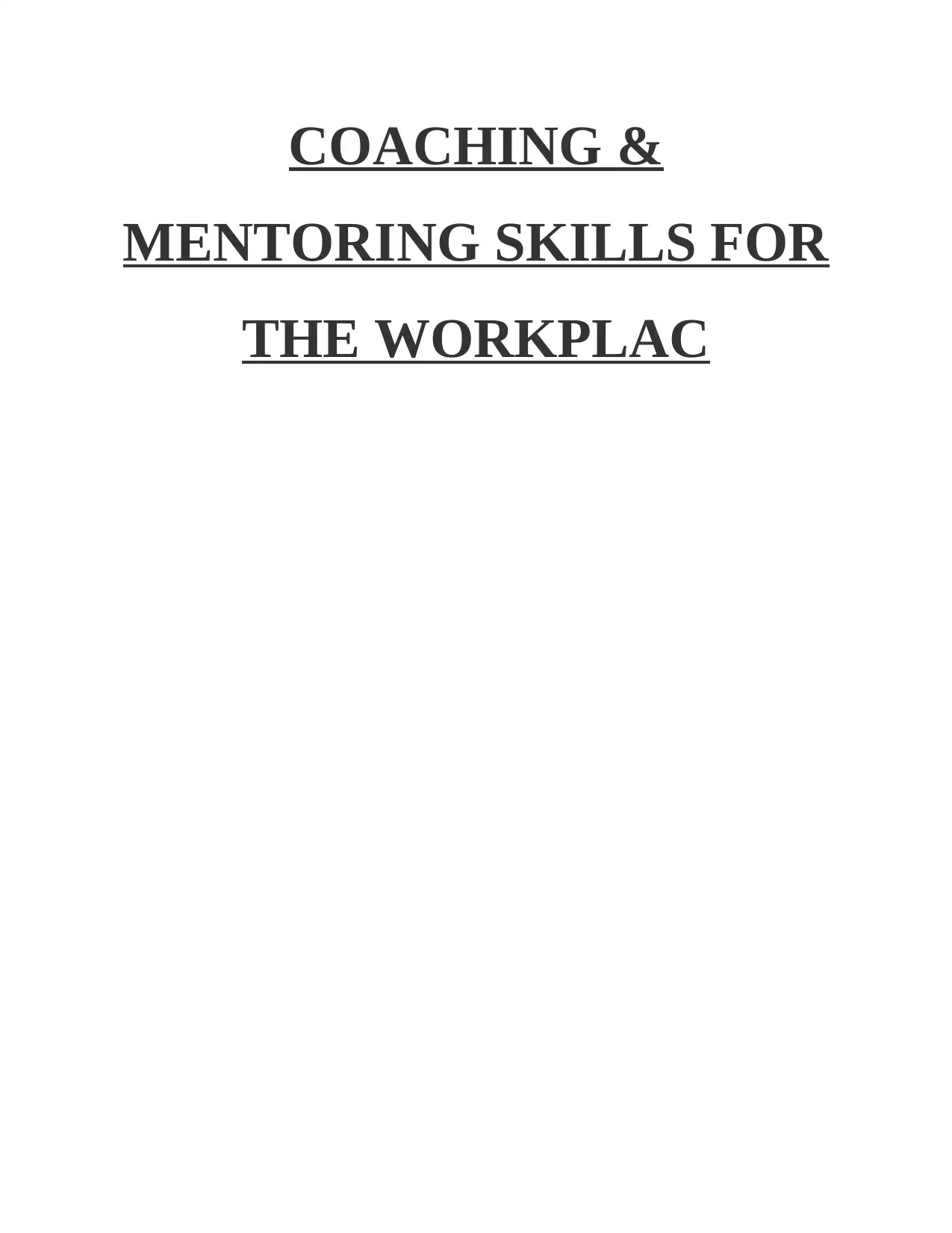
COACHING &
MENTORING SKILLS FOR
THE WORKPLAC
MENTORING SKILLS FOR
THE WORKPLAC
Secure Best Marks with AI Grader
Need help grading? Try our AI Grader for instant feedback on your assignments.
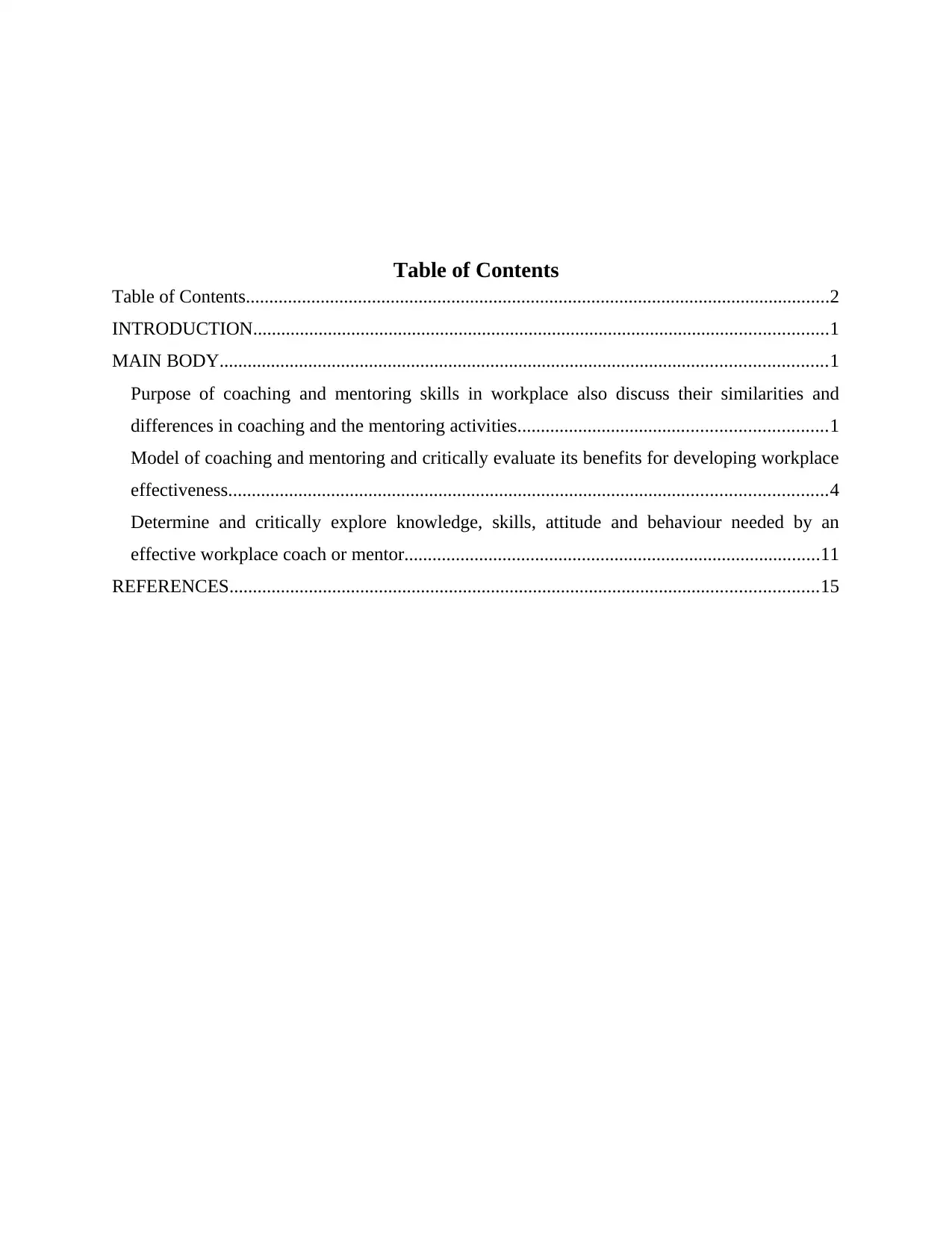
Table of Contents
Table of Contents.............................................................................................................................2
INTRODUCTION...........................................................................................................................1
MAIN BODY..................................................................................................................................1
Purpose of coaching and mentoring skills in workplace also discuss their similarities and
differences in coaching and the mentoring activities..................................................................1
Model of coaching and mentoring and critically evaluate its benefits for developing workplace
effectiveness................................................................................................................................4
Determine and critically explore knowledge, skills, attitude and behaviour needed by an
effective workplace coach or mentor.........................................................................................11
REFERENCES..............................................................................................................................15
Table of Contents.............................................................................................................................2
INTRODUCTION...........................................................................................................................1
MAIN BODY..................................................................................................................................1
Purpose of coaching and mentoring skills in workplace also discuss their similarities and
differences in coaching and the mentoring activities..................................................................1
Model of coaching and mentoring and critically evaluate its benefits for developing workplace
effectiveness................................................................................................................................4
Determine and critically explore knowledge, skills, attitude and behaviour needed by an
effective workplace coach or mentor.........................................................................................11
REFERENCES..............................................................................................................................15
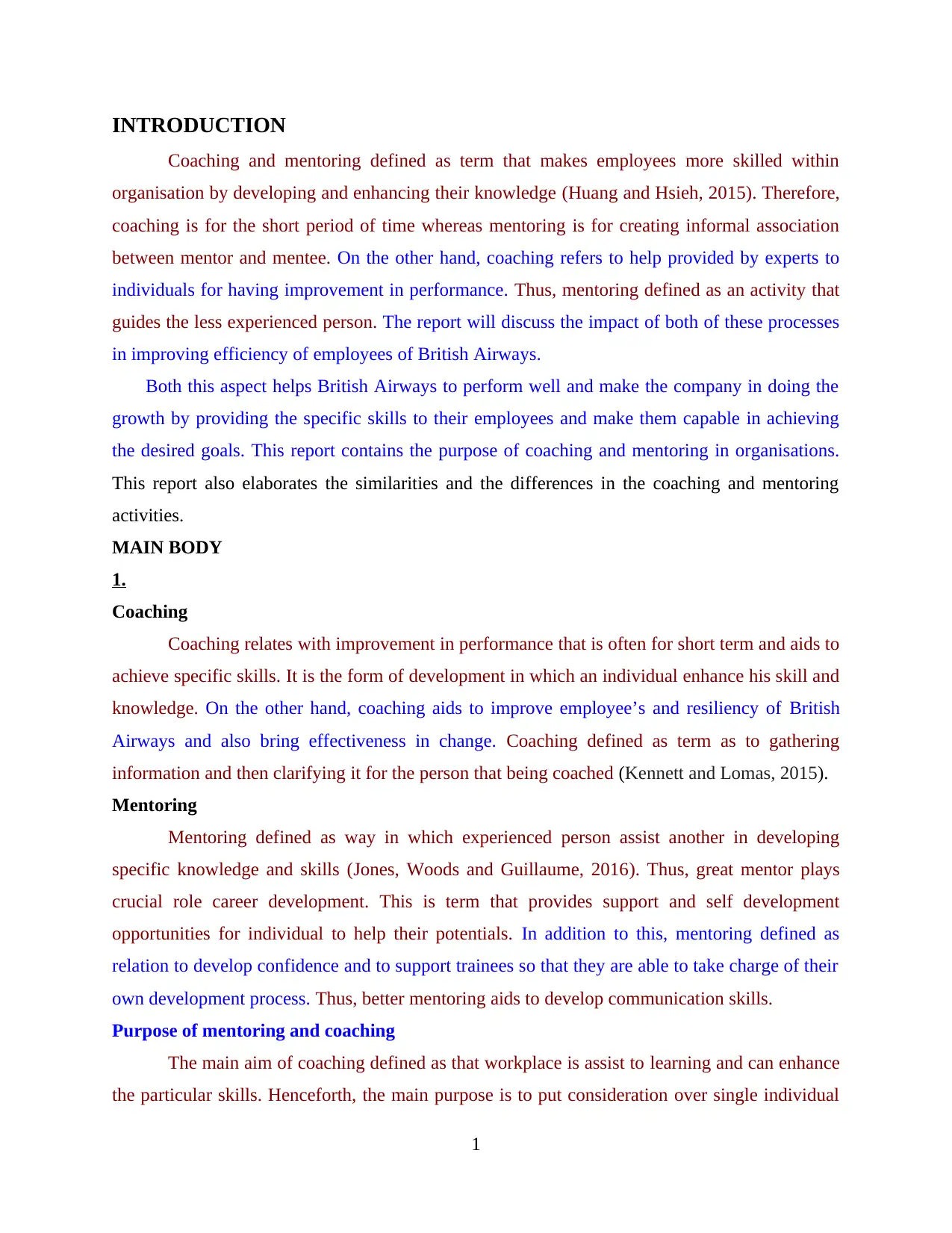
INTRODUCTION
Coaching and mentoring defined as term that makes employees more skilled within
organisation by developing and enhancing their knowledge (Huang and Hsieh, 2015). Therefore,
coaching is for the short period of time whereas mentoring is for creating informal association
between mentor and mentee. On the other hand, coaching refers to help provided by experts to
individuals for having improvement in performance. Thus, mentoring defined as an activity that
guides the less experienced person. The report will discuss the impact of both of these processes
in improving efficiency of employees of British Airways.
Both this aspect helps British Airways to perform well and make the company in doing the
growth by providing the specific skills to their employees and make them capable in achieving
the desired goals. This report contains the purpose of coaching and mentoring in organisations.
This report also elaborates the similarities and the differences in the coaching and mentoring
activities.
MAIN BODY
1.
Coaching
Coaching relates with improvement in performance that is often for short term and aids to
achieve specific skills. It is the form of development in which an individual enhance his skill and
knowledge. On the other hand, coaching aids to improve employee’s and resiliency of British
Airways and also bring effectiveness in change. Coaching defined as term as to gathering
information and then clarifying it for the person that being coached (Kennett and Lomas, 2015).
Mentoring
Mentoring defined as way in which experienced person assist another in developing
specific knowledge and skills (Jones, Woods and Guillaume, 2016). Thus, great mentor plays
crucial role career development. This is term that provides support and self development
opportunities for individual to help their potentials. In addition to this, mentoring defined as
relation to develop confidence and to support trainees so that they are able to take charge of their
own development process. Thus, better mentoring aids to develop communication skills.
Purpose of mentoring and coaching
The main aim of coaching defined as that workplace is assist to learning and can enhance
the particular skills. Henceforth, the main purpose is to put consideration over single individual
1
Coaching and mentoring defined as term that makes employees more skilled within
organisation by developing and enhancing their knowledge (Huang and Hsieh, 2015). Therefore,
coaching is for the short period of time whereas mentoring is for creating informal association
between mentor and mentee. On the other hand, coaching refers to help provided by experts to
individuals for having improvement in performance. Thus, mentoring defined as an activity that
guides the less experienced person. The report will discuss the impact of both of these processes
in improving efficiency of employees of British Airways.
Both this aspect helps British Airways to perform well and make the company in doing the
growth by providing the specific skills to their employees and make them capable in achieving
the desired goals. This report contains the purpose of coaching and mentoring in organisations.
This report also elaborates the similarities and the differences in the coaching and mentoring
activities.
MAIN BODY
1.
Coaching
Coaching relates with improvement in performance that is often for short term and aids to
achieve specific skills. It is the form of development in which an individual enhance his skill and
knowledge. On the other hand, coaching aids to improve employee’s and resiliency of British
Airways and also bring effectiveness in change. Coaching defined as term as to gathering
information and then clarifying it for the person that being coached (Kennett and Lomas, 2015).
Mentoring
Mentoring defined as way in which experienced person assist another in developing
specific knowledge and skills (Jones, Woods and Guillaume, 2016). Thus, great mentor plays
crucial role career development. This is term that provides support and self development
opportunities for individual to help their potentials. In addition to this, mentoring defined as
relation to develop confidence and to support trainees so that they are able to take charge of their
own development process. Thus, better mentoring aids to develop communication skills.
Purpose of mentoring and coaching
The main aim of coaching defined as that workplace is assist to learning and can enhance
the particular skills. Henceforth, the main purpose is to put consideration over single individual
1
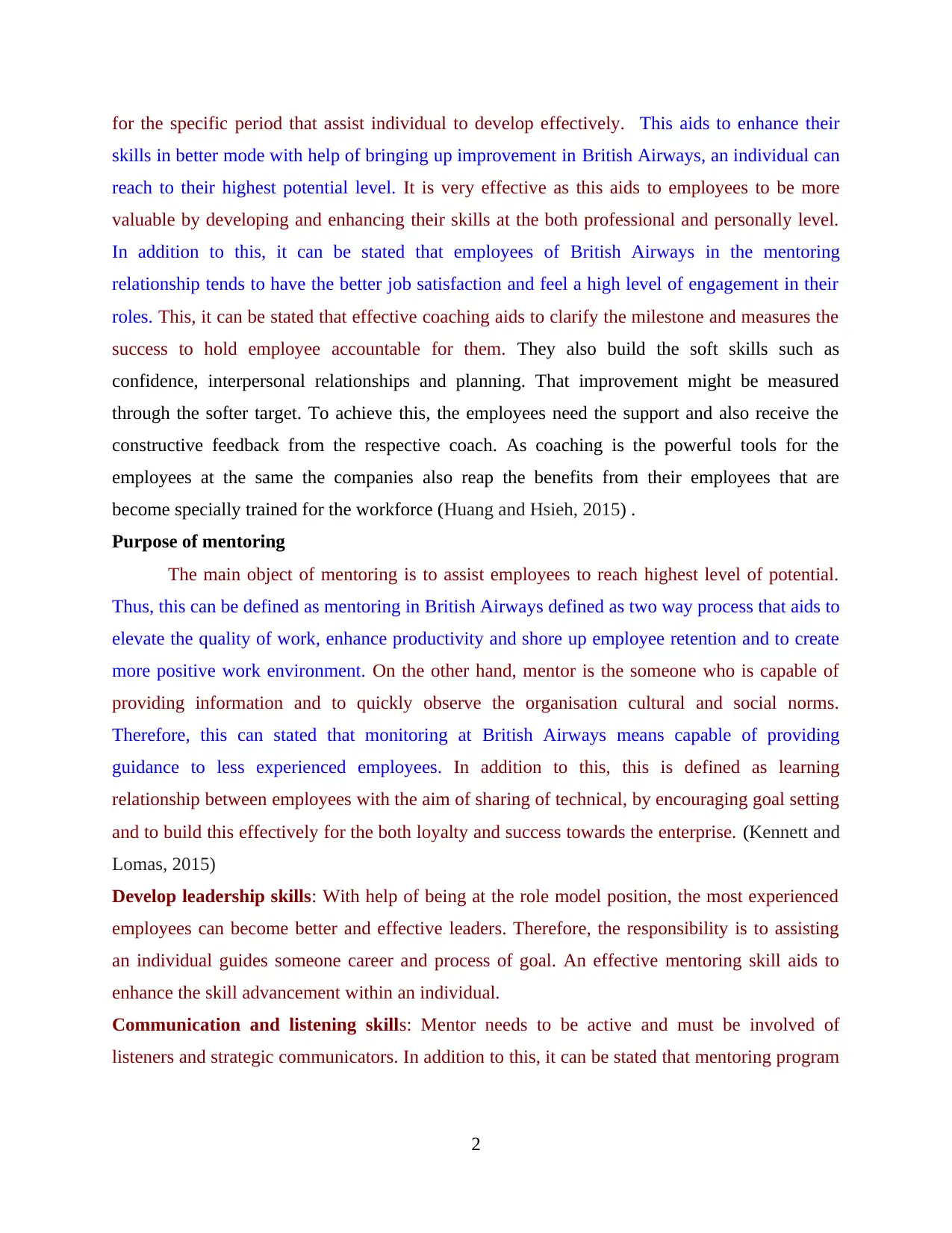
for the specific period that assist individual to develop effectively. This aids to enhance their
skills in better mode with help of bringing up improvement in British Airways, an individual can
reach to their highest potential level. It is very effective as this aids to employees to be more
valuable by developing and enhancing their skills at the both professional and personally level.
In addition to this, it can be stated that employees of British Airways in the mentoring
relationship tends to have the better job satisfaction and feel a high level of engagement in their
roles. This, it can be stated that effective coaching aids to clarify the milestone and measures the
success to hold employee accountable for them. They also build the soft skills such as
confidence, interpersonal relationships and planning. That improvement might be measured
through the softer target. To achieve this, the employees need the support and also receive the
constructive feedback from the respective coach. As coaching is the powerful tools for the
employees at the same the companies also reap the benefits from their employees that are
become specially trained for the workforce (Huang and Hsieh, 2015) .
Purpose of mentoring
The main object of mentoring is to assist employees to reach highest level of potential.
Thus, this can be defined as mentoring in British Airways defined as two way process that aids to
elevate the quality of work, enhance productivity and shore up employee retention and to create
more positive work environment. On the other hand, mentor is the someone who is capable of
providing information and to quickly observe the organisation cultural and social norms.
Therefore, this can stated that monitoring at British Airways means capable of providing
guidance to less experienced employees. In addition to this, this is defined as learning
relationship between employees with the aim of sharing of technical, by encouraging goal setting
and to build this effectively for the both loyalty and success towards the enterprise. (Kennett and
Lomas, 2015)
Develop leadership skills: With help of being at the role model position, the most experienced
employees can become better and effective leaders. Therefore, the responsibility is to assisting
an individual guides someone career and process of goal. An effective mentoring skill aids to
enhance the skill advancement within an individual.
Communication and listening skills: Mentor needs to be active and must be involved of
listeners and strategic communicators. In addition to this, it can be stated that mentoring program
2
skills in better mode with help of bringing up improvement in British Airways, an individual can
reach to their highest potential level. It is very effective as this aids to employees to be more
valuable by developing and enhancing their skills at the both professional and personally level.
In addition to this, it can be stated that employees of British Airways in the mentoring
relationship tends to have the better job satisfaction and feel a high level of engagement in their
roles. This, it can be stated that effective coaching aids to clarify the milestone and measures the
success to hold employee accountable for them. They also build the soft skills such as
confidence, interpersonal relationships and planning. That improvement might be measured
through the softer target. To achieve this, the employees need the support and also receive the
constructive feedback from the respective coach. As coaching is the powerful tools for the
employees at the same the companies also reap the benefits from their employees that are
become specially trained for the workforce (Huang and Hsieh, 2015) .
Purpose of mentoring
The main object of mentoring is to assist employees to reach highest level of potential.
Thus, this can be defined as mentoring in British Airways defined as two way process that aids to
elevate the quality of work, enhance productivity and shore up employee retention and to create
more positive work environment. On the other hand, mentor is the someone who is capable of
providing information and to quickly observe the organisation cultural and social norms.
Therefore, this can stated that monitoring at British Airways means capable of providing
guidance to less experienced employees. In addition to this, this is defined as learning
relationship between employees with the aim of sharing of technical, by encouraging goal setting
and to build this effectively for the both loyalty and success towards the enterprise. (Kennett and
Lomas, 2015)
Develop leadership skills: With help of being at the role model position, the most experienced
employees can become better and effective leaders. Therefore, the responsibility is to assisting
an individual guides someone career and process of goal. An effective mentoring skill aids to
enhance the skill advancement within an individual.
Communication and listening skills: Mentor needs to be active and must be involved of
listeners and strategic communicators. In addition to this, it can be stated that mentoring program
2
Secure Best Marks with AI Grader
Need help grading? Try our AI Grader for instant feedback on your assignments.
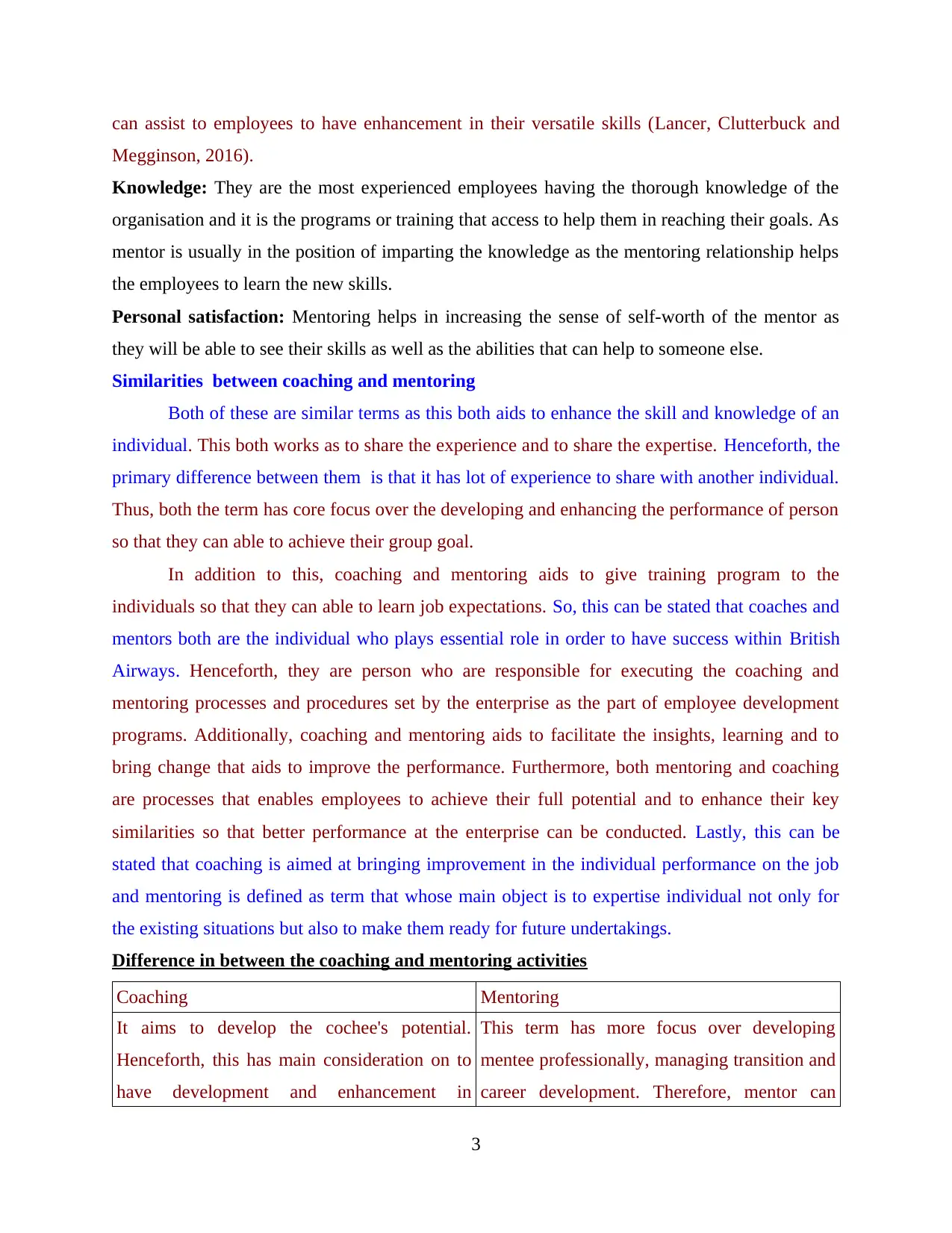
can assist to employees to have enhancement in their versatile skills (Lancer, Clutterbuck and
Megginson, 2016).
Knowledge: They are the most experienced employees having the thorough knowledge of the
organisation and it is the programs or training that access to help them in reaching their goals. As
mentor is usually in the position of imparting the knowledge as the mentoring relationship helps
the employees to learn the new skills.
Personal satisfaction: Mentoring helps in increasing the sense of self-worth of the mentor as
they will be able to see their skills as well as the abilities that can help to someone else.
Similarities between coaching and mentoring
Both of these are similar terms as this both aids to enhance the skill and knowledge of an
individual. This both works as to share the experience and to share the expertise. Henceforth, the
primary difference between them is that it has lot of experience to share with another individual.
Thus, both the term has core focus over the developing and enhancing the performance of person
so that they can able to achieve their group goal.
In addition to this, coaching and mentoring aids to give training program to the
individuals so that they can able to learn job expectations. So, this can be stated that coaches and
mentors both are the individual who plays essential role in order to have success within British
Airways. Henceforth, they are person who are responsible for executing the coaching and
mentoring processes and procedures set by the enterprise as the part of employee development
programs. Additionally, coaching and mentoring aids to facilitate the insights, learning and to
bring change that aids to improve the performance. Furthermore, both mentoring and coaching
are processes that enables employees to achieve their full potential and to enhance their key
similarities so that better performance at the enterprise can be conducted. Lastly, this can be
stated that coaching is aimed at bringing improvement in the individual performance on the job
and mentoring is defined as term that whose main object is to expertise individual not only for
the existing situations but also to make them ready for future undertakings.
Difference in between the coaching and mentoring activities
Coaching Mentoring
It aims to develop the cochee's potential.
Henceforth, this has main consideration on to
have development and enhancement in
This term has more focus over developing
mentee professionally, managing transition and
career development. Therefore, mentor can
3
Megginson, 2016).
Knowledge: They are the most experienced employees having the thorough knowledge of the
organisation and it is the programs or training that access to help them in reaching their goals. As
mentor is usually in the position of imparting the knowledge as the mentoring relationship helps
the employees to learn the new skills.
Personal satisfaction: Mentoring helps in increasing the sense of self-worth of the mentor as
they will be able to see their skills as well as the abilities that can help to someone else.
Similarities between coaching and mentoring
Both of these are similar terms as this both aids to enhance the skill and knowledge of an
individual. This both works as to share the experience and to share the expertise. Henceforth, the
primary difference between them is that it has lot of experience to share with another individual.
Thus, both the term has core focus over the developing and enhancing the performance of person
so that they can able to achieve their group goal.
In addition to this, coaching and mentoring aids to give training program to the
individuals so that they can able to learn job expectations. So, this can be stated that coaches and
mentors both are the individual who plays essential role in order to have success within British
Airways. Henceforth, they are person who are responsible for executing the coaching and
mentoring processes and procedures set by the enterprise as the part of employee development
programs. Additionally, coaching and mentoring aids to facilitate the insights, learning and to
bring change that aids to improve the performance. Furthermore, both mentoring and coaching
are processes that enables employees to achieve their full potential and to enhance their key
similarities so that better performance at the enterprise can be conducted. Lastly, this can be
stated that coaching is aimed at bringing improvement in the individual performance on the job
and mentoring is defined as term that whose main object is to expertise individual not only for
the existing situations but also to make them ready for future undertakings.
Difference in between the coaching and mentoring activities
Coaching Mentoring
It aims to develop the cochee's potential.
Henceforth, this has main consideration on to
have development and enhancement in
This term has more focus over developing
mentee professionally, managing transition and
career development. Therefore, mentor can
3
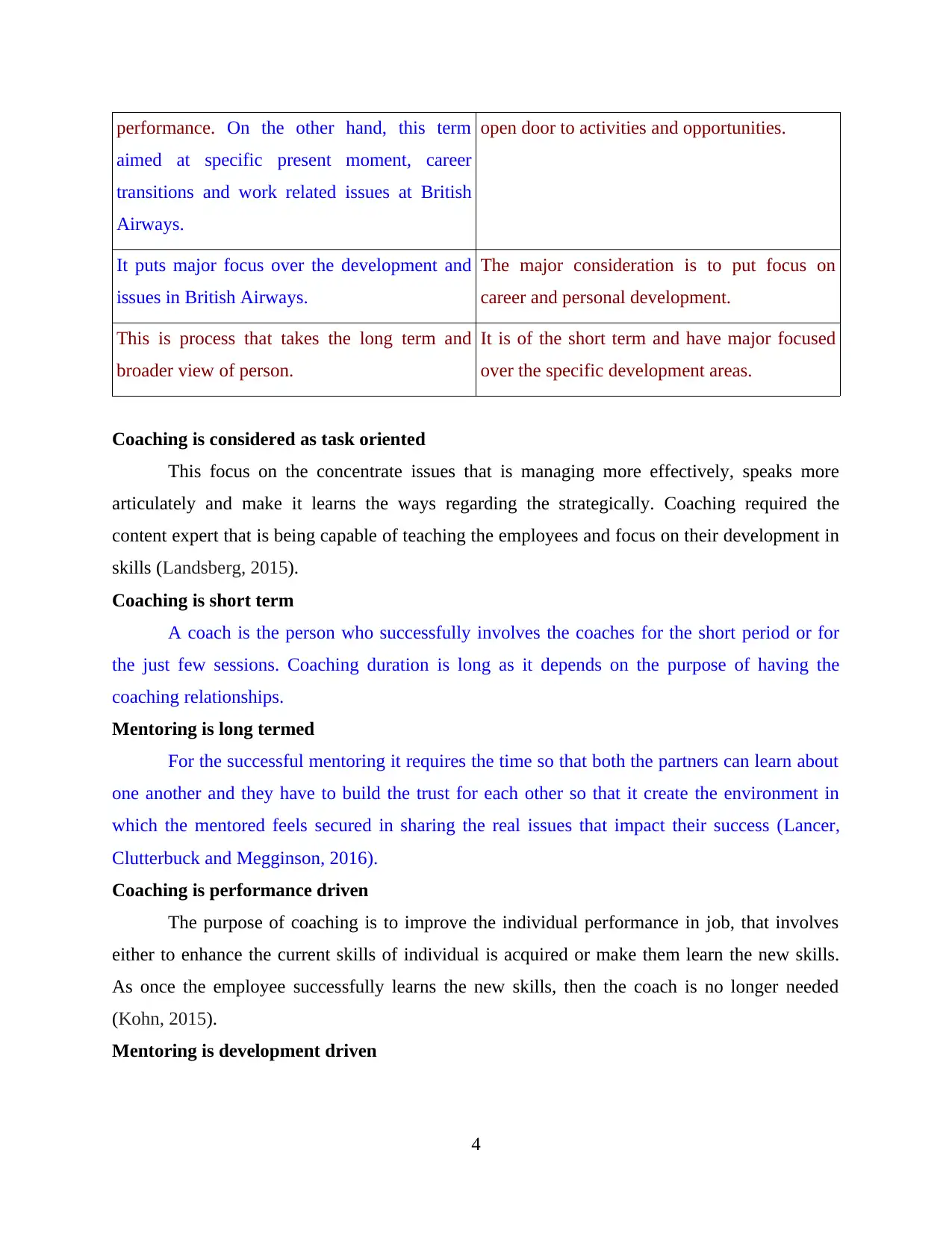
performance. On the other hand, this term
aimed at specific present moment, career
transitions and work related issues at British
Airways.
open door to activities and opportunities.
It puts major focus over the development and
issues in British Airways.
The major consideration is to put focus on
career and personal development.
This is process that takes the long term and
broader view of person.
It is of the short term and have major focused
over the specific development areas.
Coaching is considered as task oriented
This focus on the concentrate issues that is managing more effectively, speaks more
articulately and make it learns the ways regarding the strategically. Coaching required the
content expert that is being capable of teaching the employees and focus on their development in
skills (Landsberg, 2015).
Coaching is short term
A coach is the person who successfully involves the coaches for the short period or for
the just few sessions. Coaching duration is long as it depends on the purpose of having the
coaching relationships.
Mentoring is long termed
For the successful mentoring it requires the time so that both the partners can learn about
one another and they have to build the trust for each other so that it create the environment in
which the mentored feels secured in sharing the real issues that impact their success (Lancer,
Clutterbuck and Megginson, 2016).
Coaching is performance driven
The purpose of coaching is to improve the individual performance in job, that involves
either to enhance the current skills of individual is acquired or make them learn the new skills.
As once the employee successfully learns the new skills, then the coach is no longer needed
(Kohn, 2015).
Mentoring is development driven
4
aimed at specific present moment, career
transitions and work related issues at British
Airways.
open door to activities and opportunities.
It puts major focus over the development and
issues in British Airways.
The major consideration is to put focus on
career and personal development.
This is process that takes the long term and
broader view of person.
It is of the short term and have major focused
over the specific development areas.
Coaching is considered as task oriented
This focus on the concentrate issues that is managing more effectively, speaks more
articulately and make it learns the ways regarding the strategically. Coaching required the
content expert that is being capable of teaching the employees and focus on their development in
skills (Landsberg, 2015).
Coaching is short term
A coach is the person who successfully involves the coaches for the short period or for
the just few sessions. Coaching duration is long as it depends on the purpose of having the
coaching relationships.
Mentoring is long termed
For the successful mentoring it requires the time so that both the partners can learn about
one another and they have to build the trust for each other so that it create the environment in
which the mentored feels secured in sharing the real issues that impact their success (Lancer,
Clutterbuck and Megginson, 2016).
Coaching is performance driven
The purpose of coaching is to improve the individual performance in job, that involves
either to enhance the current skills of individual is acquired or make them learn the new skills.
As once the employee successfully learns the new skills, then the coach is no longer needed
(Kohn, 2015).
Mentoring is development driven
4
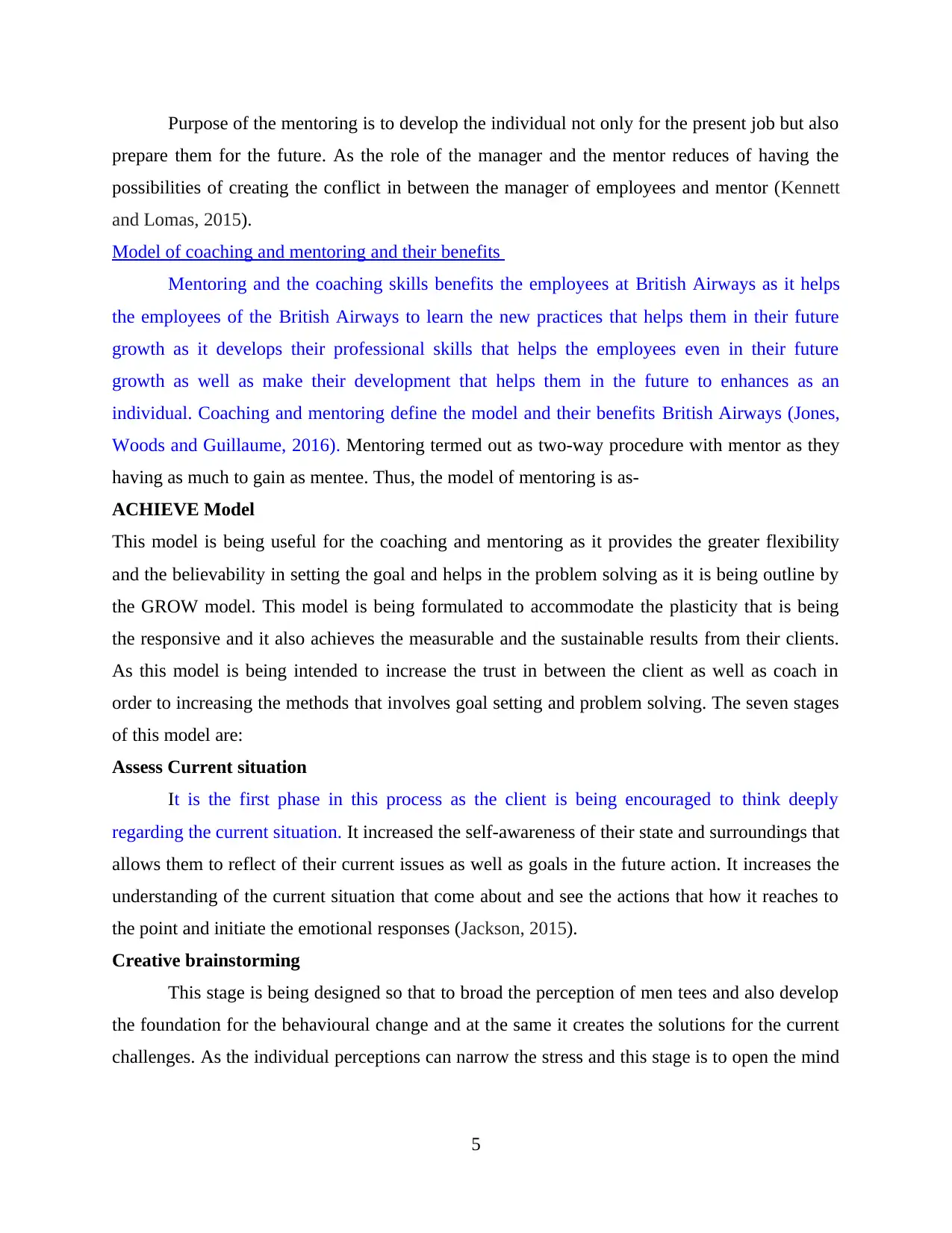
Purpose of the mentoring is to develop the individual not only for the present job but also
prepare them for the future. As the role of the manager and the mentor reduces of having the
possibilities of creating the conflict in between the manager of employees and mentor (Kennett
and Lomas, 2015).
Model of coaching and mentoring and their benefits
Mentoring and the coaching skills benefits the employees at British Airways as it helps
the employees of the British Airways to learn the new practices that helps them in their future
growth as it develops their professional skills that helps the employees even in their future
growth as well as make their development that helps them in the future to enhances as an
individual. Coaching and mentoring define the model and their benefits British Airways (Jones,
Woods and Guillaume, 2016). Mentoring termed out as two-way procedure with mentor as they
having as much to gain as mentee. Thus, the model of mentoring is as-
ACHIEVE Model
This model is being useful for the coaching and mentoring as it provides the greater flexibility
and the believability in setting the goal and helps in the problem solving as it is being outline by
the GROW model. This model is being formulated to accommodate the plasticity that is being
the responsive and it also achieves the measurable and the sustainable results from their clients.
As this model is being intended to increase the trust in between the client as well as coach in
order to increasing the methods that involves goal setting and problem solving. The seven stages
of this model are:
Assess Current situation
It is the first phase in this process as the client is being encouraged to think deeply
regarding the current situation. It increased the self-awareness of their state and surroundings that
allows them to reflect of their current issues as well as goals in the future action. It increases the
understanding of the current situation that come about and see the actions that how it reaches to
the point and initiate the emotional responses (Jackson, 2015).
Creative brainstorming
This stage is being designed so that to broad the perception of men tees and also develop
the foundation for the behavioural change and at the same it creates the solutions for the current
challenges. As the individual perceptions can narrow the stress and this stage is to open the mind
5
prepare them for the future. As the role of the manager and the mentor reduces of having the
possibilities of creating the conflict in between the manager of employees and mentor (Kennett
and Lomas, 2015).
Model of coaching and mentoring and their benefits
Mentoring and the coaching skills benefits the employees at British Airways as it helps
the employees of the British Airways to learn the new practices that helps them in their future
growth as it develops their professional skills that helps the employees even in their future
growth as well as make their development that helps them in the future to enhances as an
individual. Coaching and mentoring define the model and their benefits British Airways (Jones,
Woods and Guillaume, 2016). Mentoring termed out as two-way procedure with mentor as they
having as much to gain as mentee. Thus, the model of mentoring is as-
ACHIEVE Model
This model is being useful for the coaching and mentoring as it provides the greater flexibility
and the believability in setting the goal and helps in the problem solving as it is being outline by
the GROW model. This model is being formulated to accommodate the plasticity that is being
the responsive and it also achieves the measurable and the sustainable results from their clients.
As this model is being intended to increase the trust in between the client as well as coach in
order to increasing the methods that involves goal setting and problem solving. The seven stages
of this model are:
Assess Current situation
It is the first phase in this process as the client is being encouraged to think deeply
regarding the current situation. It increased the self-awareness of their state and surroundings that
allows them to reflect of their current issues as well as goals in the future action. It increases the
understanding of the current situation that come about and see the actions that how it reaches to
the point and initiate the emotional responses (Jackson, 2015).
Creative brainstorming
This stage is being designed so that to broad the perception of men tees and also develop
the foundation for the behavioural change and at the same it creates the solutions for the current
challenges. As the individual perceptions can narrow the stress and this stage is to open the mind
5
Paraphrase This Document
Need a fresh take? Get an instant paraphrase of this document with our AI Paraphraser
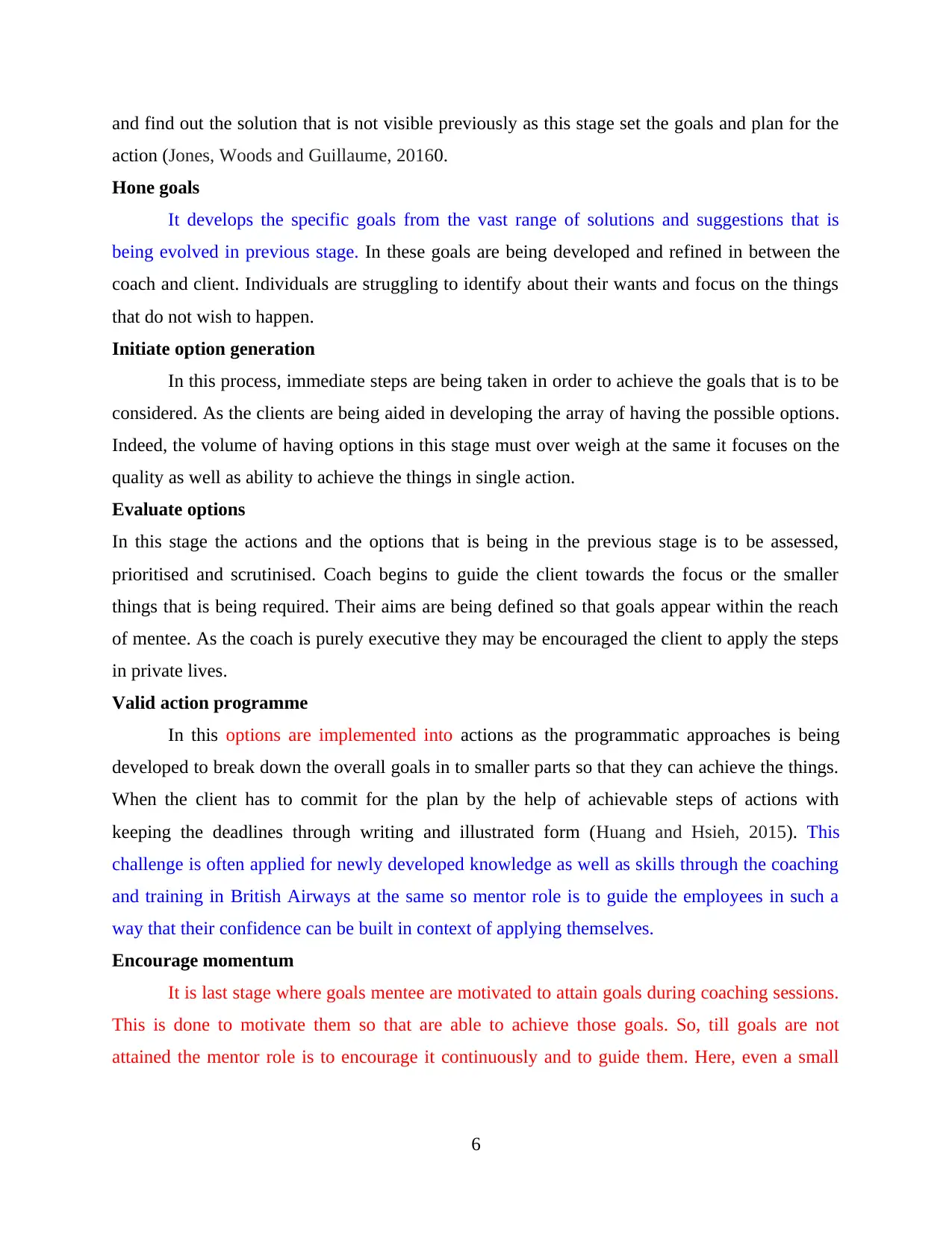
and find out the solution that is not visible previously as this stage set the goals and plan for the
action (Jones, Woods and Guillaume, 20160.
Hone goals
It develops the specific goals from the vast range of solutions and suggestions that is
being evolved in previous stage. In these goals are being developed and refined in between the
coach and client. Individuals are struggling to identify about their wants and focus on the things
that do not wish to happen.
Initiate option generation
In this process, immediate steps are being taken in order to achieve the goals that is to be
considered. As the clients are being aided in developing the array of having the possible options.
Indeed, the volume of having options in this stage must over weigh at the same it focuses on the
quality as well as ability to achieve the things in single action.
Evaluate options
In this stage the actions and the options that is being in the previous stage is to be assessed,
prioritised and scrutinised. Coach begins to guide the client towards the focus or the smaller
things that is being required. Their aims are being defined so that goals appear within the reach
of mentee. As the coach is purely executive they may be encouraged the client to apply the steps
in private lives.
Valid action programme
In this options are implemented into actions as the programmatic approaches is being
developed to break down the overall goals in to smaller parts so that they can achieve the things.
When the client has to commit for the plan by the help of achievable steps of actions with
keeping the deadlines through writing and illustrated form (Huang and Hsieh, 2015). This
challenge is often applied for newly developed knowledge as well as skills through the coaching
and training in British Airways at the same so mentor role is to guide the employees in such a
way that their confidence can be built in context of applying themselves.
Encourage momentum
It is last stage where goals mentee are motivated to attain goals during coaching sessions.
This is done to motivate them so that are able to achieve those goals. So, till goals are not
attained the mentor role is to encourage it continuously and to guide them. Here, even a small
6
action (Jones, Woods and Guillaume, 20160.
Hone goals
It develops the specific goals from the vast range of solutions and suggestions that is
being evolved in previous stage. In these goals are being developed and refined in between the
coach and client. Individuals are struggling to identify about their wants and focus on the things
that do not wish to happen.
Initiate option generation
In this process, immediate steps are being taken in order to achieve the goals that is to be
considered. As the clients are being aided in developing the array of having the possible options.
Indeed, the volume of having options in this stage must over weigh at the same it focuses on the
quality as well as ability to achieve the things in single action.
Evaluate options
In this stage the actions and the options that is being in the previous stage is to be assessed,
prioritised and scrutinised. Coach begins to guide the client towards the focus or the smaller
things that is being required. Their aims are being defined so that goals appear within the reach
of mentee. As the coach is purely executive they may be encouraged the client to apply the steps
in private lives.
Valid action programme
In this options are implemented into actions as the programmatic approaches is being
developed to break down the overall goals in to smaller parts so that they can achieve the things.
When the client has to commit for the plan by the help of achievable steps of actions with
keeping the deadlines through writing and illustrated form (Huang and Hsieh, 2015). This
challenge is often applied for newly developed knowledge as well as skills through the coaching
and training in British Airways at the same so mentor role is to guide the employees in such a
way that their confidence can be built in context of applying themselves.
Encourage momentum
It is last stage where goals mentee are motivated to attain goals during coaching sessions.
This is done to motivate them so that are able to achieve those goals. So, till goals are not
attained the mentor role is to encourage it continuously and to guide them. Here, even a small
6
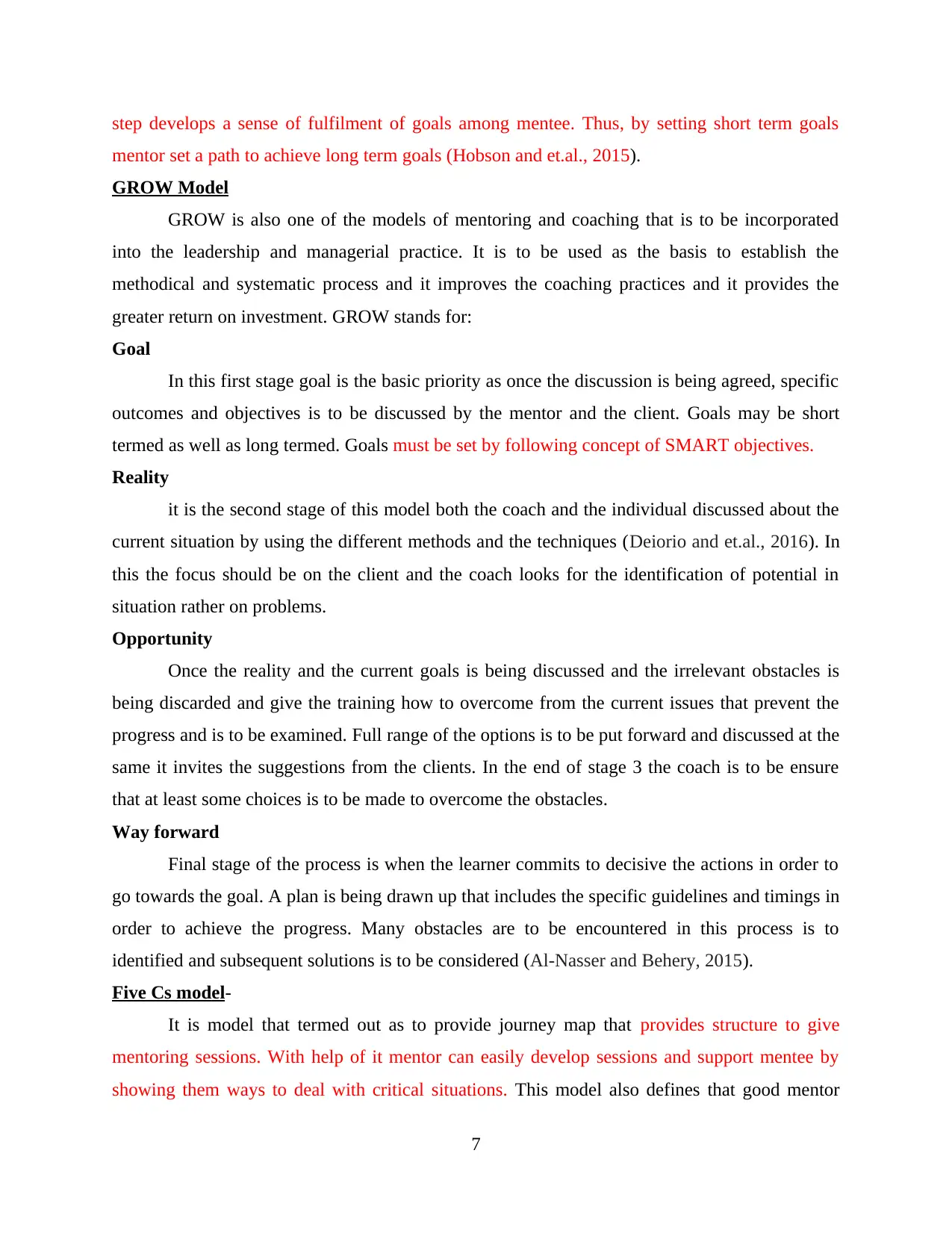
step develops a sense of fulfilment of goals among mentee. Thus, by setting short term goals
mentor set a path to achieve long term goals (Hobson and et.al., 2015).
GROW Model
GROW is also one of the models of mentoring and coaching that is to be incorporated
into the leadership and managerial practice. It is to be used as the basis to establish the
methodical and systematic process and it improves the coaching practices and it provides the
greater return on investment. GROW stands for:
Goal
In this first stage goal is the basic priority as once the discussion is being agreed, specific
outcomes and objectives is to be discussed by the mentor and the client. Goals may be short
termed as well as long termed. Goals must be set by following concept of SMART objectives.
Reality
it is the second stage of this model both the coach and the individual discussed about the
current situation by using the different methods and the techniques (Deiorio and et.al., 2016). In
this the focus should be on the client and the coach looks for the identification of potential in
situation rather on problems.
Opportunity
Once the reality and the current goals is being discussed and the irrelevant obstacles is
being discarded and give the training how to overcome from the current issues that prevent the
progress and is to be examined. Full range of the options is to be put forward and discussed at the
same it invites the suggestions from the clients. In the end of stage 3 the coach is to be ensure
that at least some choices is to be made to overcome the obstacles.
Way forward
Final stage of the process is when the learner commits to decisive the actions in order to
go towards the goal. A plan is being drawn up that includes the specific guidelines and timings in
order to achieve the progress. Many obstacles are to be encountered in this process is to
identified and subsequent solutions is to be considered (Al-Nasser and Behery, 2015).
Five Cs model-
It is model that termed out as to provide journey map that provides structure to give
mentoring sessions. With help of it mentor can easily develop sessions and support mentee by
showing them ways to deal with critical situations. This model also defines that good mentor
7
mentor set a path to achieve long term goals (Hobson and et.al., 2015).
GROW Model
GROW is also one of the models of mentoring and coaching that is to be incorporated
into the leadership and managerial practice. It is to be used as the basis to establish the
methodical and systematic process and it improves the coaching practices and it provides the
greater return on investment. GROW stands for:
Goal
In this first stage goal is the basic priority as once the discussion is being agreed, specific
outcomes and objectives is to be discussed by the mentor and the client. Goals may be short
termed as well as long termed. Goals must be set by following concept of SMART objectives.
Reality
it is the second stage of this model both the coach and the individual discussed about the
current situation by using the different methods and the techniques (Deiorio and et.al., 2016). In
this the focus should be on the client and the coach looks for the identification of potential in
situation rather on problems.
Opportunity
Once the reality and the current goals is being discussed and the irrelevant obstacles is
being discarded and give the training how to overcome from the current issues that prevent the
progress and is to be examined. Full range of the options is to be put forward and discussed at the
same it invites the suggestions from the clients. In the end of stage 3 the coach is to be ensure
that at least some choices is to be made to overcome the obstacles.
Way forward
Final stage of the process is when the learner commits to decisive the actions in order to
go towards the goal. A plan is being drawn up that includes the specific guidelines and timings in
order to achieve the progress. Many obstacles are to be encountered in this process is to
identified and subsequent solutions is to be considered (Al-Nasser and Behery, 2015).
Five Cs model-
It is model that termed out as to provide journey map that provides structure to give
mentoring sessions. With help of it mentor can easily develop sessions and support mentee by
showing them ways to deal with critical situations. This model also defines that good mentor
7
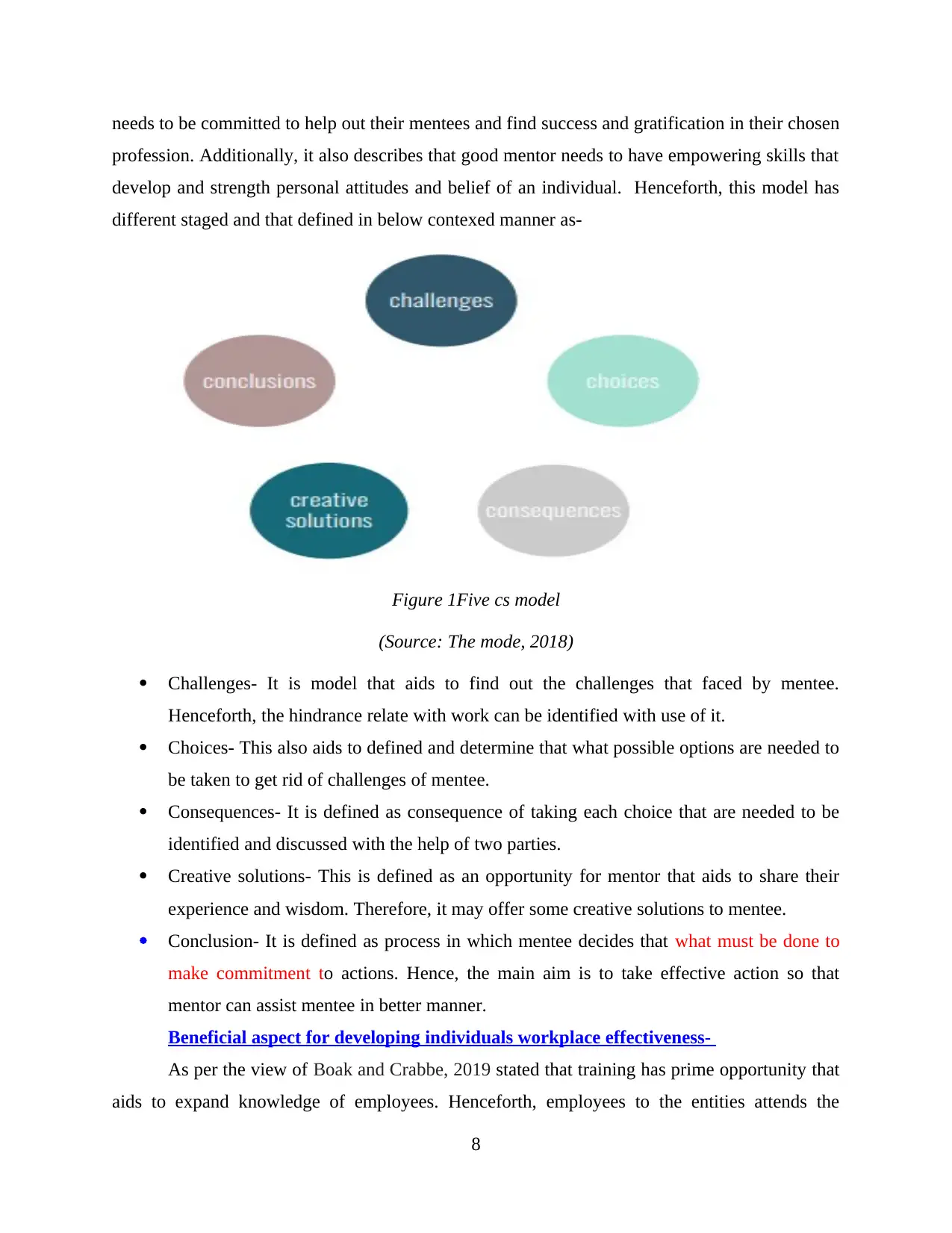
needs to be committed to help out their mentees and find success and gratification in their chosen
profession. Additionally, it also describes that good mentor needs to have empowering skills that
develop and strength personal attitudes and belief of an individual. Henceforth, this model has
different staged and that defined in below contexed manner as-
Figure 1Five cs model
(Source: The mode, 2018)
Challenges- It is model that aids to find out the challenges that faced by mentee.
Henceforth, the hindrance relate with work can be identified with use of it.
Choices- This also aids to defined and determine that what possible options are needed to
be taken to get rid of challenges of mentee.
Consequences- It is defined as consequence of taking each choice that are needed to be
identified and discussed with the help of two parties.
Creative solutions- This is defined as an opportunity for mentor that aids to share their
experience and wisdom. Therefore, it may offer some creative solutions to mentee.
Conclusion- It is defined as process in which mentee decides that what must be done to
make commitment to actions. Hence, the main aim is to take effective action so that
mentor can assist mentee in better manner.
Beneficial aspect for developing individuals workplace effectiveness-
As per the view of Boak and Crabbe, 2019 stated that training has prime opportunity that
aids to expand knowledge of employees. Henceforth, employees to the entities attends the
8
profession. Additionally, it also describes that good mentor needs to have empowering skills that
develop and strength personal attitudes and belief of an individual. Henceforth, this model has
different staged and that defined in below contexed manner as-
Figure 1Five cs model
(Source: The mode, 2018)
Challenges- It is model that aids to find out the challenges that faced by mentee.
Henceforth, the hindrance relate with work can be identified with use of it.
Choices- This also aids to defined and determine that what possible options are needed to
be taken to get rid of challenges of mentee.
Consequences- It is defined as consequence of taking each choice that are needed to be
identified and discussed with the help of two parties.
Creative solutions- This is defined as an opportunity for mentor that aids to share their
experience and wisdom. Therefore, it may offer some creative solutions to mentee.
Conclusion- It is defined as process in which mentee decides that what must be done to
make commitment to actions. Hence, the main aim is to take effective action so that
mentor can assist mentee in better manner.
Beneficial aspect for developing individuals workplace effectiveness-
As per the view of Boak and Crabbe, 2019 stated that training has prime opportunity that
aids to expand knowledge of employees. Henceforth, employees to the entities attends the
8
Secure Best Marks with AI Grader
Need help grading? Try our AI Grader for instant feedback on your assignments.
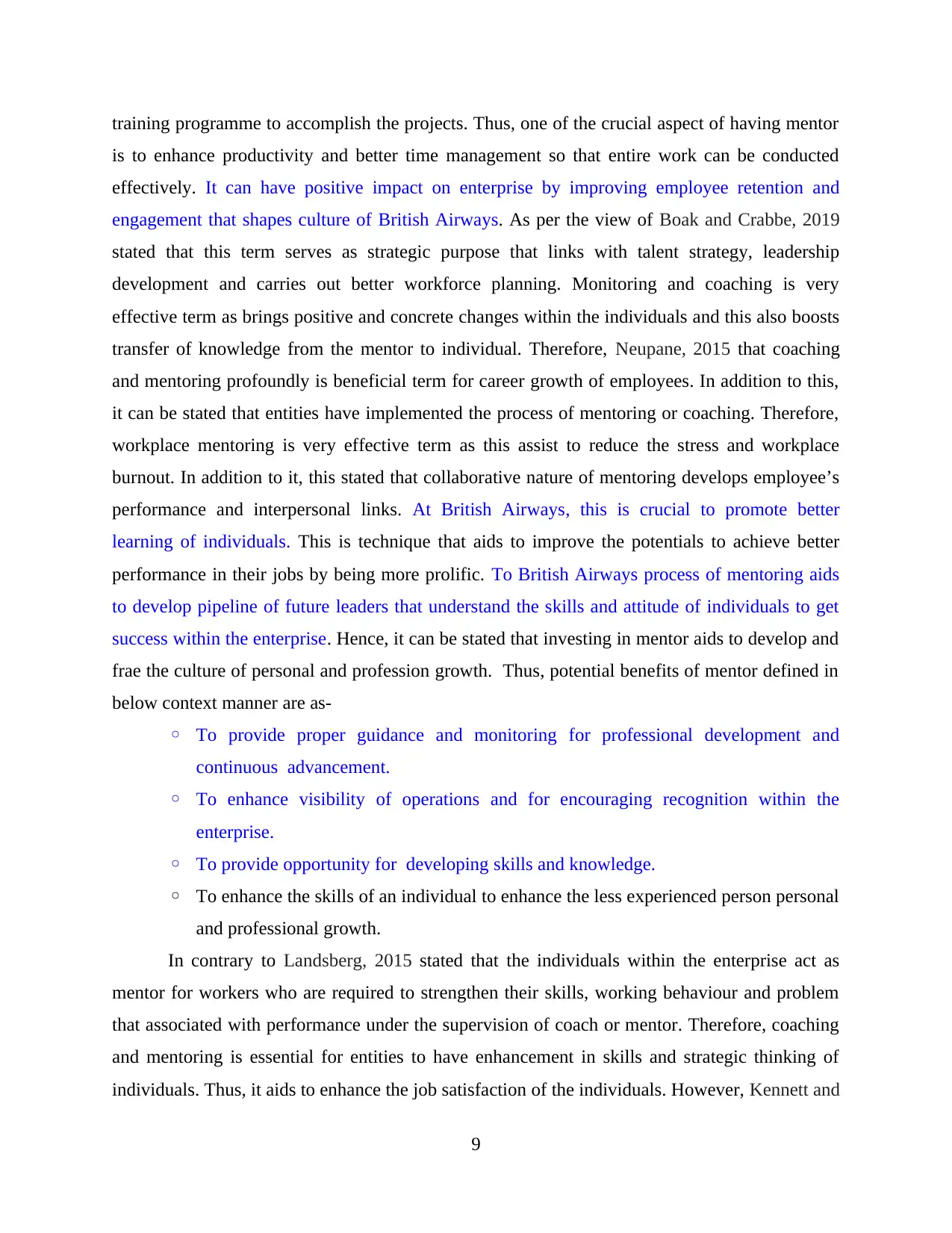
training programme to accomplish the projects. Thus, one of the crucial aspect of having mentor
is to enhance productivity and better time management so that entire work can be conducted
effectively. It can have positive impact on enterprise by improving employee retention and
engagement that shapes culture of British Airways. As per the view of Boak and Crabbe, 2019
stated that this term serves as strategic purpose that links with talent strategy, leadership
development and carries out better workforce planning. Monitoring and coaching is very
effective term as brings positive and concrete changes within the individuals and this also boosts
transfer of knowledge from the mentor to individual. Therefore, Neupane, 2015 that coaching
and mentoring profoundly is beneficial term for career growth of employees. In addition to this,
it can be stated that entities have implemented the process of mentoring or coaching. Therefore,
workplace mentoring is very effective term as this assist to reduce the stress and workplace
burnout. In addition to it, this stated that collaborative nature of mentoring develops employee’s
performance and interpersonal links. At British Airways, this is crucial to promote better
learning of individuals. This is technique that aids to improve the potentials to achieve better
performance in their jobs by being more prolific. To British Airways process of mentoring aids
to develop pipeline of future leaders that understand the skills and attitude of individuals to get
success within the enterprise. Hence, it can be stated that investing in mentor aids to develop and
frae the culture of personal and profession growth. Thus, potential benefits of mentor defined in
below context manner are as-
◦ To provide proper guidance and monitoring for professional development and
continuous advancement.
◦ To enhance visibility of operations and for encouraging recognition within the
enterprise.
◦ To provide opportunity for developing skills and knowledge.
◦ To enhance the skills of an individual to enhance the less experienced person personal
and professional growth.
In contrary to Landsberg, 2015 stated that the individuals within the enterprise act as
mentor for workers who are required to strengthen their skills, working behaviour and problem
that associated with performance under the supervision of coach or mentor. Therefore, coaching
and mentoring is essential for entities to have enhancement in skills and strategic thinking of
individuals. Thus, it aids to enhance the job satisfaction of the individuals. However, Kennett and
9
is to enhance productivity and better time management so that entire work can be conducted
effectively. It can have positive impact on enterprise by improving employee retention and
engagement that shapes culture of British Airways. As per the view of Boak and Crabbe, 2019
stated that this term serves as strategic purpose that links with talent strategy, leadership
development and carries out better workforce planning. Monitoring and coaching is very
effective term as brings positive and concrete changes within the individuals and this also boosts
transfer of knowledge from the mentor to individual. Therefore, Neupane, 2015 that coaching
and mentoring profoundly is beneficial term for career growth of employees. In addition to this,
it can be stated that entities have implemented the process of mentoring or coaching. Therefore,
workplace mentoring is very effective term as this assist to reduce the stress and workplace
burnout. In addition to it, this stated that collaborative nature of mentoring develops employee’s
performance and interpersonal links. At British Airways, this is crucial to promote better
learning of individuals. This is technique that aids to improve the potentials to achieve better
performance in their jobs by being more prolific. To British Airways process of mentoring aids
to develop pipeline of future leaders that understand the skills and attitude of individuals to get
success within the enterprise. Hence, it can be stated that investing in mentor aids to develop and
frae the culture of personal and profession growth. Thus, potential benefits of mentor defined in
below context manner are as-
◦ To provide proper guidance and monitoring for professional development and
continuous advancement.
◦ To enhance visibility of operations and for encouraging recognition within the
enterprise.
◦ To provide opportunity for developing skills and knowledge.
◦ To enhance the skills of an individual to enhance the less experienced person personal
and professional growth.
In contrary to Landsberg, 2015 stated that the individuals within the enterprise act as
mentor for workers who are required to strengthen their skills, working behaviour and problem
that associated with performance under the supervision of coach or mentor. Therefore, coaching
and mentoring is essential for entities to have enhancement in skills and strategic thinking of
individuals. Thus, it aids to enhance the job satisfaction of the individuals. However, Kennett and
9
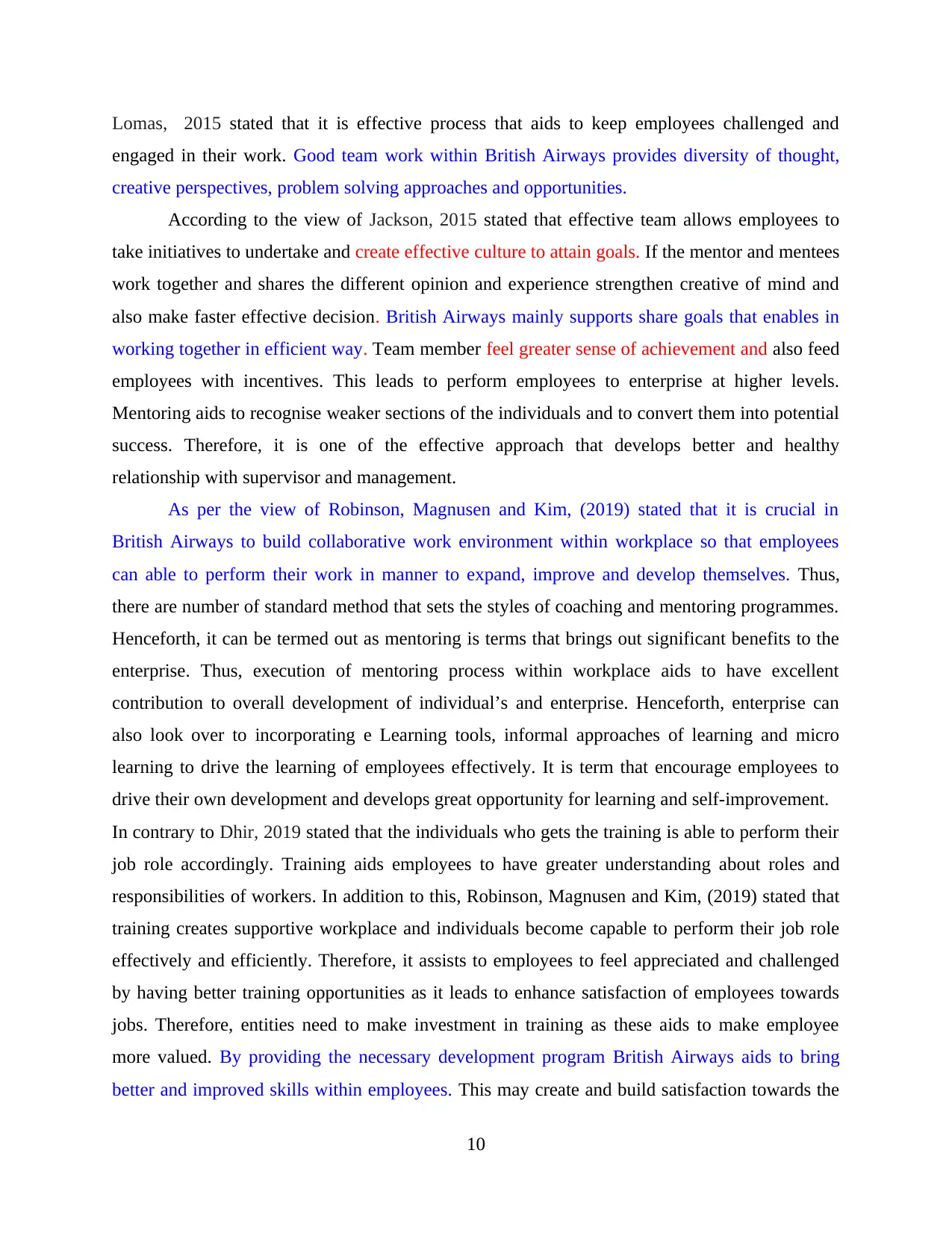
Lomas, 2015 stated that it is effective process that aids to keep employees challenged and
engaged in their work. Good team work within British Airways provides diversity of thought,
creative perspectives, problem solving approaches and opportunities.
According to the view of Jackson, 2015 stated that effective team allows employees to
take initiatives to undertake and create effective culture to attain goals. If the mentor and mentees
work together and shares the different opinion and experience strengthen creative of mind and
also make faster effective decision. British Airways mainly supports share goals that enables in
working together in efficient way. Team member feel greater sense of achievement and also feed
employees with incentives. This leads to perform employees to enterprise at higher levels.
Mentoring aids to recognise weaker sections of the individuals and to convert them into potential
success. Therefore, it is one of the effective approach that develops better and healthy
relationship with supervisor and management.
As per the view of Robinson, Magnusen and Kim, (2019) stated that it is crucial in
British Airways to build collaborative work environment within workplace so that employees
can able to perform their work in manner to expand, improve and develop themselves. Thus,
there are number of standard method that sets the styles of coaching and mentoring programmes.
Henceforth, it can be termed out as mentoring is terms that brings out significant benefits to the
enterprise. Thus, execution of mentoring process within workplace aids to have excellent
contribution to overall development of individual’s and enterprise. Henceforth, enterprise can
also look over to incorporating e Learning tools, informal approaches of learning and micro
learning to drive the learning of employees effectively. It is term that encourage employees to
drive their own development and develops great opportunity for learning and self-improvement.
In contrary to Dhir, 2019 stated that the individuals who gets the training is able to perform their
job role accordingly. Training aids employees to have greater understanding about roles and
responsibilities of workers. In addition to this, Robinson, Magnusen and Kim, (2019) stated that
training creates supportive workplace and individuals become capable to perform their job role
effectively and efficiently. Therefore, it assists to employees to feel appreciated and challenged
by having better training opportunities as it leads to enhance satisfaction of employees towards
jobs. Therefore, entities need to make investment in training as these aids to make employee
more valued. By providing the necessary development program British Airways aids to bring
better and improved skills within employees. This may create and build satisfaction towards the
10
engaged in their work. Good team work within British Airways provides diversity of thought,
creative perspectives, problem solving approaches and opportunities.
According to the view of Jackson, 2015 stated that effective team allows employees to
take initiatives to undertake and create effective culture to attain goals. If the mentor and mentees
work together and shares the different opinion and experience strengthen creative of mind and
also make faster effective decision. British Airways mainly supports share goals that enables in
working together in efficient way. Team member feel greater sense of achievement and also feed
employees with incentives. This leads to perform employees to enterprise at higher levels.
Mentoring aids to recognise weaker sections of the individuals and to convert them into potential
success. Therefore, it is one of the effective approach that develops better and healthy
relationship with supervisor and management.
As per the view of Robinson, Magnusen and Kim, (2019) stated that it is crucial in
British Airways to build collaborative work environment within workplace so that employees
can able to perform their work in manner to expand, improve and develop themselves. Thus,
there are number of standard method that sets the styles of coaching and mentoring programmes.
Henceforth, it can be termed out as mentoring is terms that brings out significant benefits to the
enterprise. Thus, execution of mentoring process within workplace aids to have excellent
contribution to overall development of individual’s and enterprise. Henceforth, enterprise can
also look over to incorporating e Learning tools, informal approaches of learning and micro
learning to drive the learning of employees effectively. It is term that encourage employees to
drive their own development and develops great opportunity for learning and self-improvement.
In contrary to Dhir, 2019 stated that the individuals who gets the training is able to perform their
job role accordingly. Training aids employees to have greater understanding about roles and
responsibilities of workers. In addition to this, Robinson, Magnusen and Kim, (2019) stated that
training creates supportive workplace and individuals become capable to perform their job role
effectively and efficiently. Therefore, it assists to employees to feel appreciated and challenged
by having better training opportunities as it leads to enhance satisfaction of employees towards
jobs. Therefore, entities need to make investment in training as these aids to make employee
more valued. By providing the necessary development program British Airways aids to bring
better and improved skills within employees. This may create and build satisfaction towards the
10
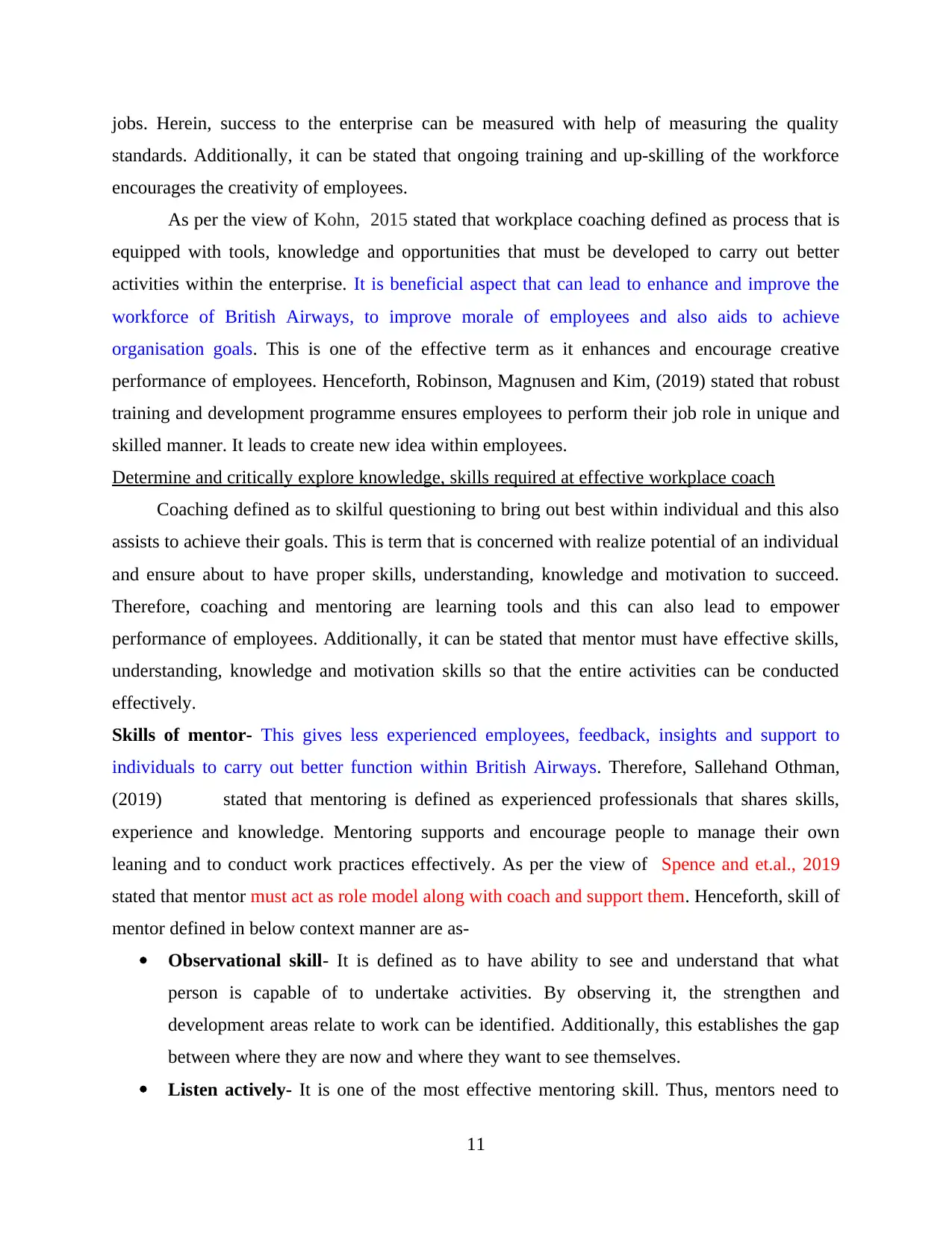
jobs. Herein, success to the enterprise can be measured with help of measuring the quality
standards. Additionally, it can be stated that ongoing training and up-skilling of the workforce
encourages the creativity of employees.
As per the view of Kohn, 2015 stated that workplace coaching defined as process that is
equipped with tools, knowledge and opportunities that must be developed to carry out better
activities within the enterprise. It is beneficial aspect that can lead to enhance and improve the
workforce of British Airways, to improve morale of employees and also aids to achieve
organisation goals. This is one of the effective term as it enhances and encourage creative
performance of employees. Henceforth, Robinson, Magnusen and Kim, (2019) stated that robust
training and development programme ensures employees to perform their job role in unique and
skilled manner. It leads to create new idea within employees.
Determine and critically explore knowledge, skills required at effective workplace coach
Coaching defined as to skilful questioning to bring out best within individual and this also
assists to achieve their goals. This is term that is concerned with realize potential of an individual
and ensure about to have proper skills, understanding, knowledge and motivation to succeed.
Therefore, coaching and mentoring are learning tools and this can also lead to empower
performance of employees. Additionally, it can be stated that mentor must have effective skills,
understanding, knowledge and motivation skills so that the entire activities can be conducted
effectively.
Skills of mentor- This gives less experienced employees, feedback, insights and support to
individuals to carry out better function within British Airways. Therefore, Sallehand Othman,
(2019) stated that mentoring is defined as experienced professionals that shares skills,
experience and knowledge. Mentoring supports and encourage people to manage their own
leaning and to conduct work practices effectively. As per the view of Spence and et.al., 2019
stated that mentor must act as role model along with coach and support them. Henceforth, skill of
mentor defined in below context manner are as-
Observational skill- It is defined as to have ability to see and understand that what
person is capable of to undertake activities. By observing it, the strengthen and
development areas relate to work can be identified. Additionally, this establishes the gap
between where they are now and where they want to see themselves.
Listen actively- It is one of the most effective mentoring skill. Thus, mentors need to
11
standards. Additionally, it can be stated that ongoing training and up-skilling of the workforce
encourages the creativity of employees.
As per the view of Kohn, 2015 stated that workplace coaching defined as process that is
equipped with tools, knowledge and opportunities that must be developed to carry out better
activities within the enterprise. It is beneficial aspect that can lead to enhance and improve the
workforce of British Airways, to improve morale of employees and also aids to achieve
organisation goals. This is one of the effective term as it enhances and encourage creative
performance of employees. Henceforth, Robinson, Magnusen and Kim, (2019) stated that robust
training and development programme ensures employees to perform their job role in unique and
skilled manner. It leads to create new idea within employees.
Determine and critically explore knowledge, skills required at effective workplace coach
Coaching defined as to skilful questioning to bring out best within individual and this also
assists to achieve their goals. This is term that is concerned with realize potential of an individual
and ensure about to have proper skills, understanding, knowledge and motivation to succeed.
Therefore, coaching and mentoring are learning tools and this can also lead to empower
performance of employees. Additionally, it can be stated that mentor must have effective skills,
understanding, knowledge and motivation skills so that the entire activities can be conducted
effectively.
Skills of mentor- This gives less experienced employees, feedback, insights and support to
individuals to carry out better function within British Airways. Therefore, Sallehand Othman,
(2019) stated that mentoring is defined as experienced professionals that shares skills,
experience and knowledge. Mentoring supports and encourage people to manage their own
leaning and to conduct work practices effectively. As per the view of Spence and et.al., 2019
stated that mentor must act as role model along with coach and support them. Henceforth, skill of
mentor defined in below context manner are as-
Observational skill- It is defined as to have ability to see and understand that what
person is capable of to undertake activities. By observing it, the strengthen and
development areas relate to work can be identified. Additionally, this establishes the gap
between where they are now and where they want to see themselves.
Listen actively- It is one of the most effective mentoring skill. Thus, mentors need to
11
Paraphrase This Document
Need a fresh take? Get an instant paraphrase of this document with our AI Paraphraser
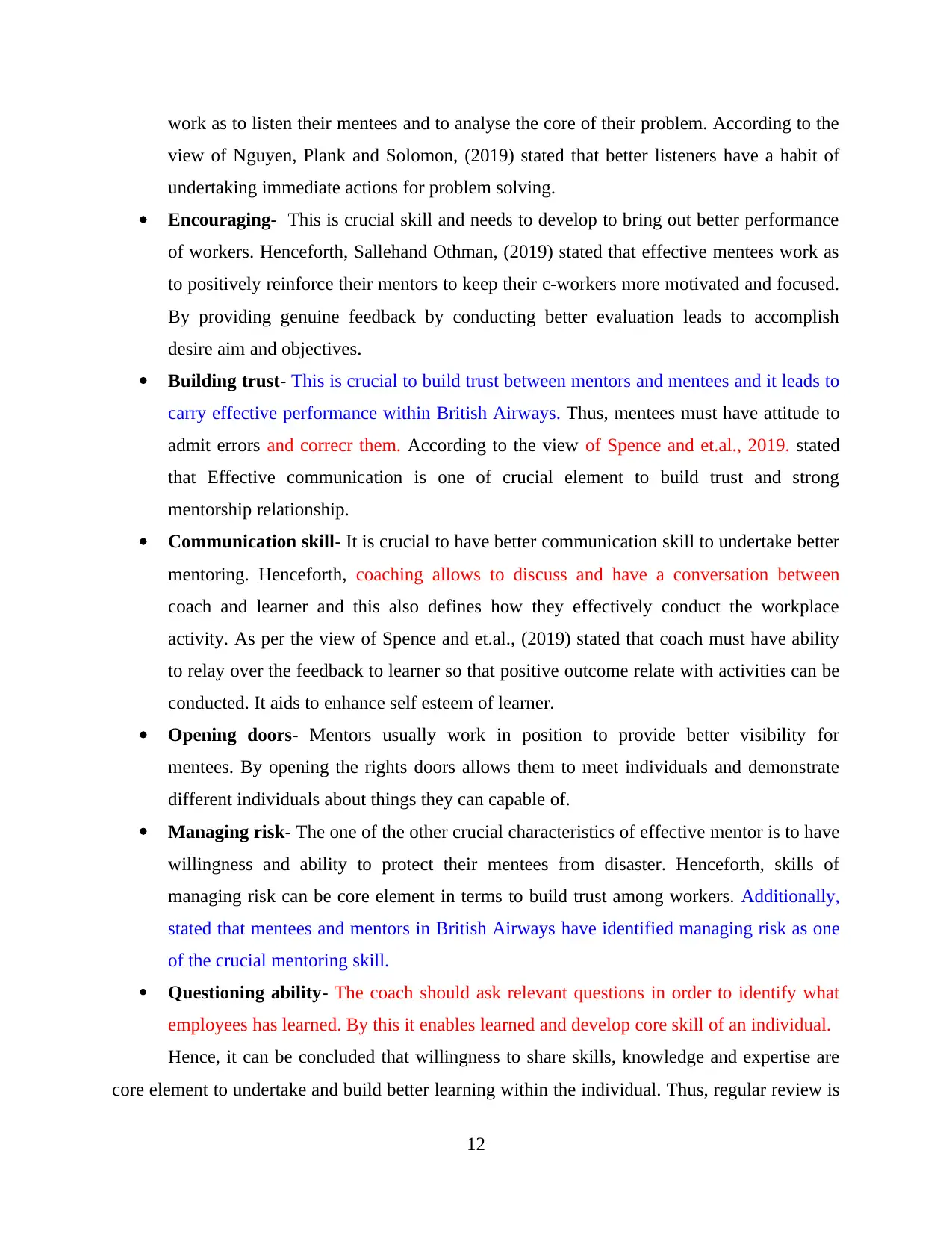
work as to listen their mentees and to analyse the core of their problem. According to the
view of Nguyen, Plank and Solomon, (2019) stated that better listeners have a habit of
undertaking immediate actions for problem solving.
Encouraging- This is crucial skill and needs to develop to bring out better performance
of workers. Henceforth, Sallehand Othman, (2019) stated that effective mentees work as
to positively reinforce their mentors to keep their c-workers more motivated and focused.
By providing genuine feedback by conducting better evaluation leads to accomplish
desire aim and objectives.
Building trust- This is crucial to build trust between mentors and mentees and it leads to
carry effective performance within British Airways. Thus, mentees must have attitude to
admit errors and correcr them. According to the view of Spence and et.al., 2019. stated
that Effective communication is one of crucial element to build trust and strong
mentorship relationship.
Communication skill- It is crucial to have better communication skill to undertake better
mentoring. Henceforth, coaching allows to discuss and have a conversation between
coach and learner and this also defines how they effectively conduct the workplace
activity. As per the view of Spence and et.al., (2019) stated that coach must have ability
to relay over the feedback to learner so that positive outcome relate with activities can be
conducted. It aids to enhance self esteem of learner.
Opening doors- Mentors usually work in position to provide better visibility for
mentees. By opening the rights doors allows them to meet individuals and demonstrate
different individuals about things they can capable of.
Managing risk- The one of the other crucial characteristics of effective mentor is to have
willingness and ability to protect their mentees from disaster. Henceforth, skills of
managing risk can be core element in terms to build trust among workers. Additionally,
stated that mentees and mentors in British Airways have identified managing risk as one
of the crucial mentoring skill.
Questioning ability- The coach should ask relevant questions in order to identify what
employees has learned. By this it enables learned and develop core skill of an individual.
Hence, it can be concluded that willingness to share skills, knowledge and expertise are
core element to undertake and build better learning within the individual. Thus, regular review is
12
view of Nguyen, Plank and Solomon, (2019) stated that better listeners have a habit of
undertaking immediate actions for problem solving.
Encouraging- This is crucial skill and needs to develop to bring out better performance
of workers. Henceforth, Sallehand Othman, (2019) stated that effective mentees work as
to positively reinforce their mentors to keep their c-workers more motivated and focused.
By providing genuine feedback by conducting better evaluation leads to accomplish
desire aim and objectives.
Building trust- This is crucial to build trust between mentors and mentees and it leads to
carry effective performance within British Airways. Thus, mentees must have attitude to
admit errors and correcr them. According to the view of Spence and et.al., 2019. stated
that Effective communication is one of crucial element to build trust and strong
mentorship relationship.
Communication skill- It is crucial to have better communication skill to undertake better
mentoring. Henceforth, coaching allows to discuss and have a conversation between
coach and learner and this also defines how they effectively conduct the workplace
activity. As per the view of Spence and et.al., (2019) stated that coach must have ability
to relay over the feedback to learner so that positive outcome relate with activities can be
conducted. It aids to enhance self esteem of learner.
Opening doors- Mentors usually work in position to provide better visibility for
mentees. By opening the rights doors allows them to meet individuals and demonstrate
different individuals about things they can capable of.
Managing risk- The one of the other crucial characteristics of effective mentor is to have
willingness and ability to protect their mentees from disaster. Henceforth, skills of
managing risk can be core element in terms to build trust among workers. Additionally,
stated that mentees and mentors in British Airways have identified managing risk as one
of the crucial mentoring skill.
Questioning ability- The coach should ask relevant questions in order to identify what
employees has learned. By this it enables learned and develop core skill of an individual.
Hence, it can be concluded that willingness to share skills, knowledge and expertise are
core element to undertake and build better learning within the individual. Thus, regular review is
12
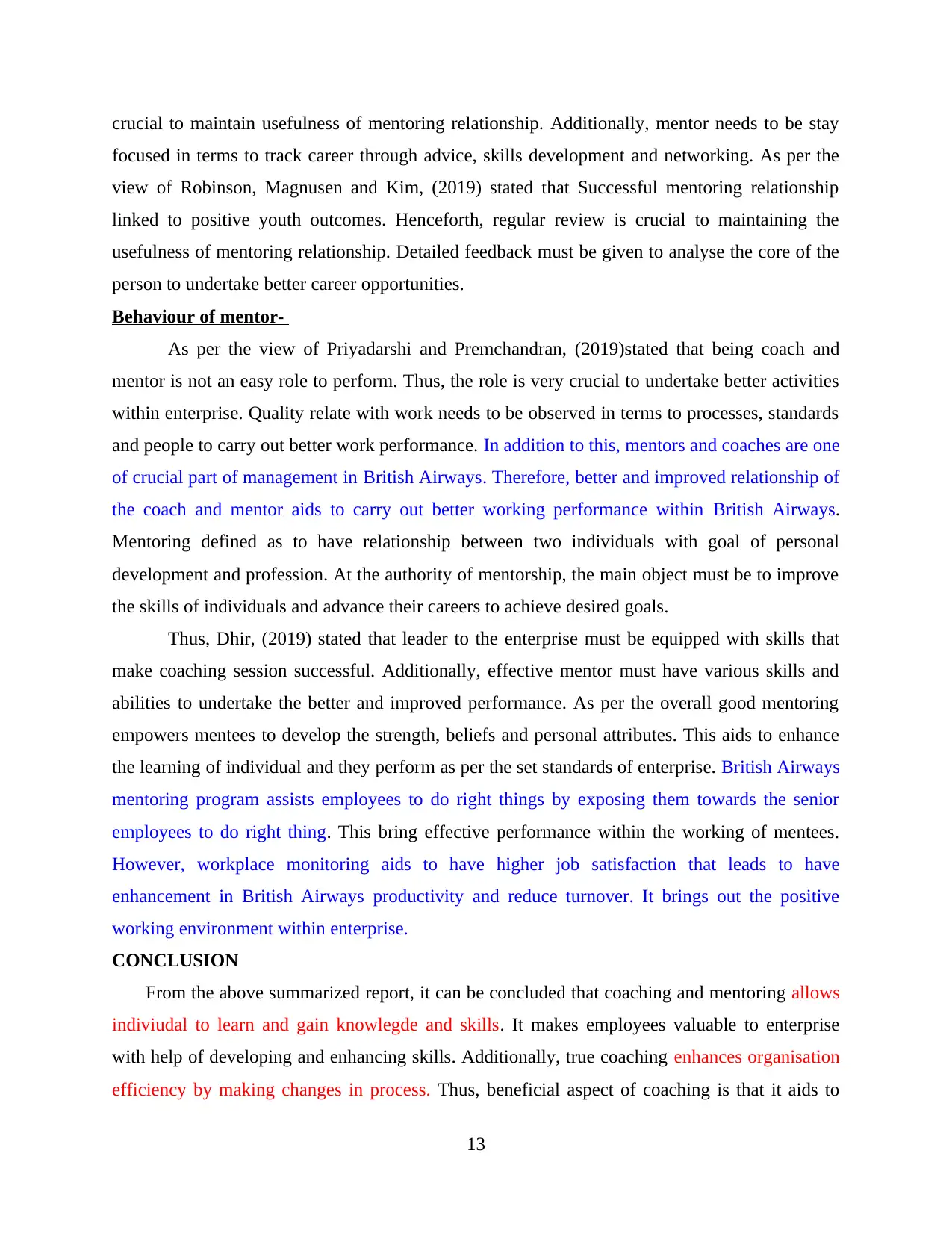
crucial to maintain usefulness of mentoring relationship. Additionally, mentor needs to be stay
focused in terms to track career through advice, skills development and networking. As per the
view of Robinson, Magnusen and Kim, (2019) stated that Successful mentoring relationship
linked to positive youth outcomes. Henceforth, regular review is crucial to maintaining the
usefulness of mentoring relationship. Detailed feedback must be given to analyse the core of the
person to undertake better career opportunities.
Behaviour of mentor-
As per the view of Priyadarshi and Premchandran, (2019)stated that being coach and
mentor is not an easy role to perform. Thus, the role is very crucial to undertake better activities
within enterprise. Quality relate with work needs to be observed in terms to processes, standards
and people to carry out better work performance. In addition to this, mentors and coaches are one
of crucial part of management in British Airways. Therefore, better and improved relationship of
the coach and mentor aids to carry out better working performance within British Airways.
Mentoring defined as to have relationship between two individuals with goal of personal
development and profession. At the authority of mentorship, the main object must be to improve
the skills of individuals and advance their careers to achieve desired goals.
Thus, Dhir, (2019) stated that leader to the enterprise must be equipped with skills that
make coaching session successful. Additionally, effective mentor must have various skills and
abilities to undertake the better and improved performance. As per the overall good mentoring
empowers mentees to develop the strength, beliefs and personal attributes. This aids to enhance
the learning of individual and they perform as per the set standards of enterprise. British Airways
mentoring program assists employees to do right things by exposing them towards the senior
employees to do right thing. This bring effective performance within the working of mentees.
However, workplace monitoring aids to have higher job satisfaction that leads to have
enhancement in British Airways productivity and reduce turnover. It brings out the positive
working environment within enterprise.
CONCLUSION
From the above summarized report, it can be concluded that coaching and mentoring allows
indiviudal to learn and gain knowlegde and skills. It makes employees valuable to enterprise
with help of developing and enhancing skills. Additionally, true coaching enhances organisation
efficiency by making changes in process. Thus, beneficial aspect of coaching is that it aids to
13
focused in terms to track career through advice, skills development and networking. As per the
view of Robinson, Magnusen and Kim, (2019) stated that Successful mentoring relationship
linked to positive youth outcomes. Henceforth, regular review is crucial to maintaining the
usefulness of mentoring relationship. Detailed feedback must be given to analyse the core of the
person to undertake better career opportunities.
Behaviour of mentor-
As per the view of Priyadarshi and Premchandran, (2019)stated that being coach and
mentor is not an easy role to perform. Thus, the role is very crucial to undertake better activities
within enterprise. Quality relate with work needs to be observed in terms to processes, standards
and people to carry out better work performance. In addition to this, mentors and coaches are one
of crucial part of management in British Airways. Therefore, better and improved relationship of
the coach and mentor aids to carry out better working performance within British Airways.
Mentoring defined as to have relationship between two individuals with goal of personal
development and profession. At the authority of mentorship, the main object must be to improve
the skills of individuals and advance their careers to achieve desired goals.
Thus, Dhir, (2019) stated that leader to the enterprise must be equipped with skills that
make coaching session successful. Additionally, effective mentor must have various skills and
abilities to undertake the better and improved performance. As per the overall good mentoring
empowers mentees to develop the strength, beliefs and personal attributes. This aids to enhance
the learning of individual and they perform as per the set standards of enterprise. British Airways
mentoring program assists employees to do right things by exposing them towards the senior
employees to do right thing. This bring effective performance within the working of mentees.
However, workplace monitoring aids to have higher job satisfaction that leads to have
enhancement in British Airways productivity and reduce turnover. It brings out the positive
working environment within enterprise.
CONCLUSION
From the above summarized report, it can be concluded that coaching and mentoring allows
indiviudal to learn and gain knowlegde and skills. It makes employees valuable to enterprise
with help of developing and enhancing skills. Additionally, true coaching enhances organisation
efficiency by making changes in process. Thus, beneficial aspect of coaching is that it aids to
13
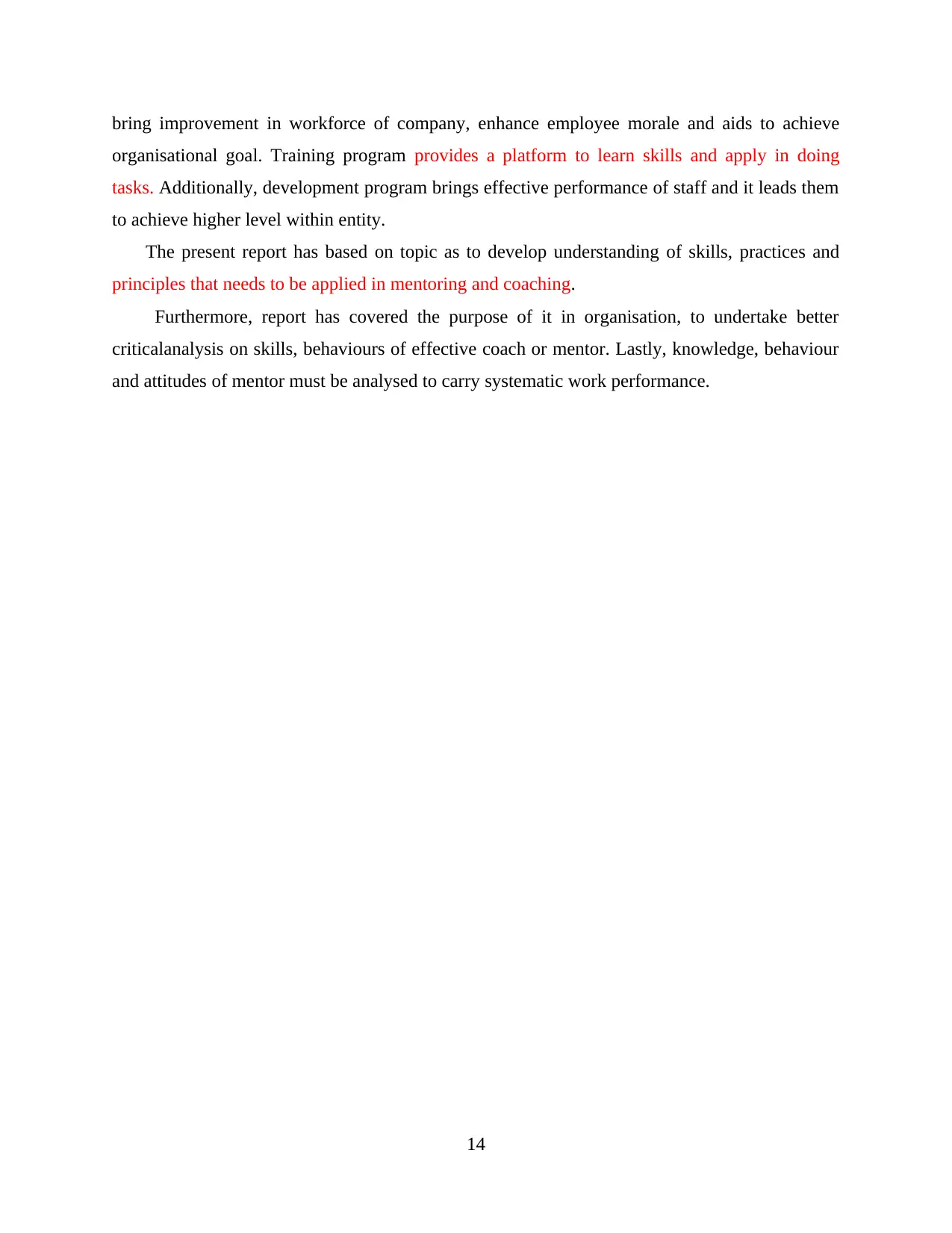
bring improvement in workforce of company, enhance employee morale and aids to achieve
organisational goal. Training program provides a platform to learn skills and apply in doing
tasks. Additionally, development program brings effective performance of staff and it leads them
to achieve higher level within entity.
The present report has based on topic as to develop understanding of skills, practices and
principles that needs to be applied in mentoring and coaching.
Furthermore, report has covered the purpose of it in organisation, to undertake better
criticalanalysis on skills, behaviours of effective coach or mentor. Lastly, knowledge, behaviour
and attitudes of mentor must be analysed to carry systematic work performance.
14
organisational goal. Training program provides a platform to learn skills and apply in doing
tasks. Additionally, development program brings effective performance of staff and it leads them
to achieve higher level within entity.
The present report has based on topic as to develop understanding of skills, practices and
principles that needs to be applied in mentoring and coaching.
Furthermore, report has covered the purpose of it in organisation, to undertake better
criticalanalysis on skills, behaviours of effective coach or mentor. Lastly, knowledge, behaviour
and attitudes of mentor must be analysed to carry systematic work performance.
14
Secure Best Marks with AI Grader
Need help grading? Try our AI Grader for instant feedback on your assignments.
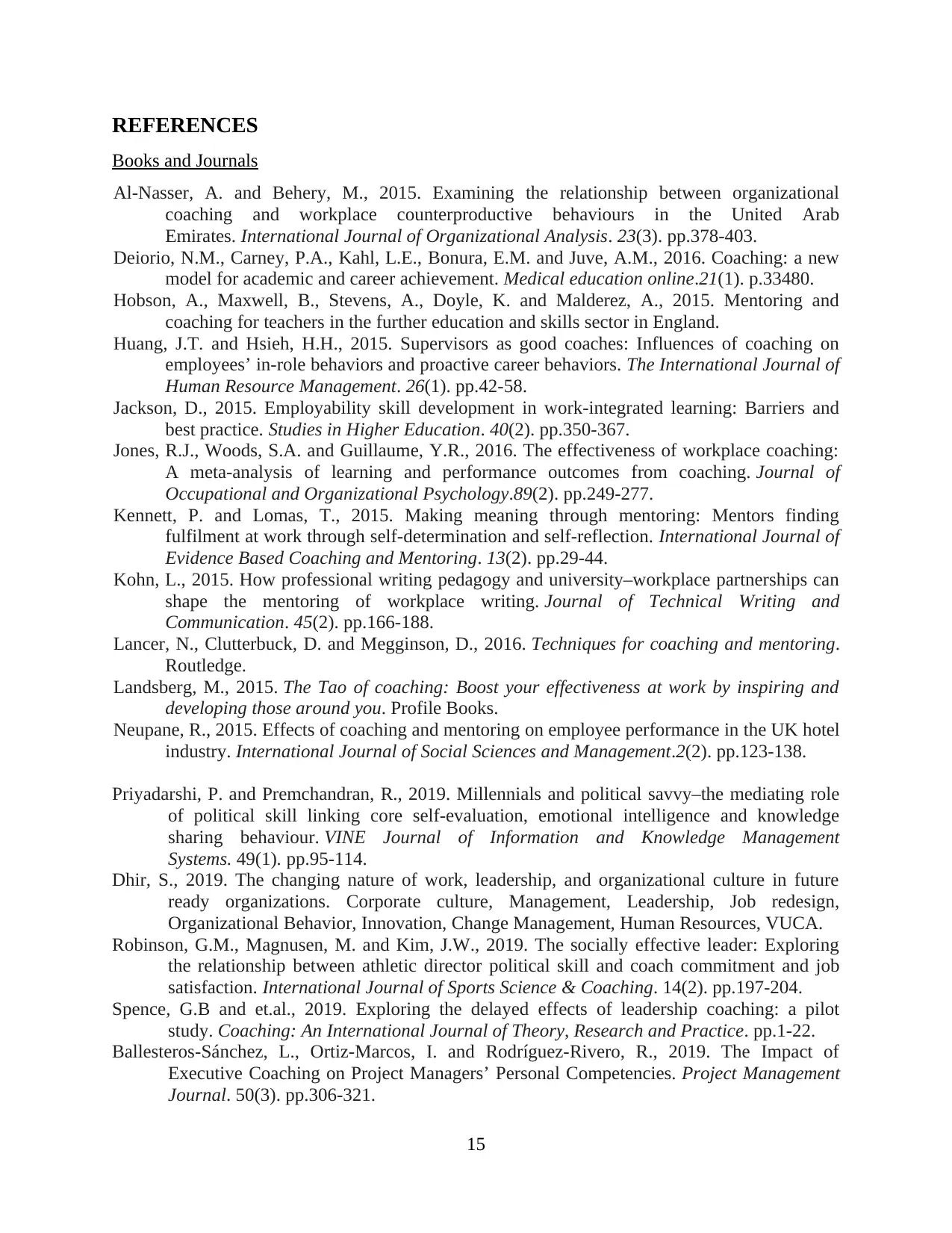
REFERENCES
Books and Journals
Al-Nasser, A. and Behery, M., 2015. Examining the relationship between organizational
coaching and workplace counterproductive behaviours in the United Arab
Emirates. International Journal of Organizational Analysis. 23(3). pp.378-403.
Deiorio, N.M., Carney, P.A., Kahl, L.E., Bonura, E.M. and Juve, A.M., 2016. Coaching: a new
model for academic and career achievement. Medical education online.21(1). p.33480.
Hobson, A., Maxwell, B., Stevens, A., Doyle, K. and Malderez, A., 2015. Mentoring and
coaching for teachers in the further education and skills sector in England.
Huang, J.T. and Hsieh, H.H., 2015. Supervisors as good coaches: Influences of coaching on
employees’ in-role behaviors and proactive career behaviors. The International Journal of
Human Resource Management. 26(1). pp.42-58.
Jackson, D., 2015. Employability skill development in work-integrated learning: Barriers and
best practice. Studies in Higher Education. 40(2). pp.350-367.
Jones, R.J., Woods, S.A. and Guillaume, Y.R., 2016. The effectiveness of workplace coaching:
A meta‐analysis of learning and performance outcomes from coaching. Journal of
Occupational and Organizational Psychology.89(2). pp.249-277.
Kennett, P. and Lomas, T., 2015. Making meaning through mentoring: Mentors finding
fulfilment at work through self-determination and self-reflection. International Journal of
Evidence Based Coaching and Mentoring. 13(2). pp.29-44.
Kohn, L., 2015. How professional writing pedagogy and university–workplace partnerships can
shape the mentoring of workplace writing. Journal of Technical Writing and
Communication. 45(2). pp.166-188.
Lancer, N., Clutterbuck, D. and Megginson, D., 2016. Techniques for coaching and mentoring.
Routledge.
Landsberg, M., 2015. The Tao of coaching: Boost your effectiveness at work by inspiring and
developing those around you. Profile Books.
Neupane, R., 2015. Effects of coaching and mentoring on employee performance in the UK hotel
industry. International Journal of Social Sciences and Management.2(2). pp.123-138.
Priyadarshi, P. and Premchandran, R., 2019. Millennials and political savvy–the mediating role
of political skill linking core self-evaluation, emotional intelligence and knowledge
sharing behaviour. VINE Journal of Information and Knowledge Management
Systems. 49(1). pp.95-114.
Dhir, S., 2019. The changing nature of work, leadership, and organizational culture in future
ready organizations. Corporate culture, Management, Leadership, Job redesign,
Organizational Behavior, Innovation, Change Management, Human Resources, VUCA.
Robinson, G.M., Magnusen, M. and Kim, J.W., 2019. The socially effective leader: Exploring
the relationship between athletic director political skill and coach commitment and job
satisfaction. International Journal of Sports Science & Coaching. 14(2). pp.197-204.
Spence, G.B and et.al., 2019. Exploring the delayed effects of leadership coaching: a pilot
study. Coaching: An International Journal of Theory, Research and Practice. pp.1-22.
Ballesteros-Sánchez, L., Ortiz-Marcos, I. and Rodríguez-Rivero, R., 2019. The Impact of
Executive Coaching on Project Managers’ Personal Competencies. Project Management
Journal. 50(3). pp.306-321.
15
Books and Journals
Al-Nasser, A. and Behery, M., 2015. Examining the relationship between organizational
coaching and workplace counterproductive behaviours in the United Arab
Emirates. International Journal of Organizational Analysis. 23(3). pp.378-403.
Deiorio, N.M., Carney, P.A., Kahl, L.E., Bonura, E.M. and Juve, A.M., 2016. Coaching: a new
model for academic and career achievement. Medical education online.21(1). p.33480.
Hobson, A., Maxwell, B., Stevens, A., Doyle, K. and Malderez, A., 2015. Mentoring and
coaching for teachers in the further education and skills sector in England.
Huang, J.T. and Hsieh, H.H., 2015. Supervisors as good coaches: Influences of coaching on
employees’ in-role behaviors and proactive career behaviors. The International Journal of
Human Resource Management. 26(1). pp.42-58.
Jackson, D., 2015. Employability skill development in work-integrated learning: Barriers and
best practice. Studies in Higher Education. 40(2). pp.350-367.
Jones, R.J., Woods, S.A. and Guillaume, Y.R., 2016. The effectiveness of workplace coaching:
A meta‐analysis of learning and performance outcomes from coaching. Journal of
Occupational and Organizational Psychology.89(2). pp.249-277.
Kennett, P. and Lomas, T., 2015. Making meaning through mentoring: Mentors finding
fulfilment at work through self-determination and self-reflection. International Journal of
Evidence Based Coaching and Mentoring. 13(2). pp.29-44.
Kohn, L., 2015. How professional writing pedagogy and university–workplace partnerships can
shape the mentoring of workplace writing. Journal of Technical Writing and
Communication. 45(2). pp.166-188.
Lancer, N., Clutterbuck, D. and Megginson, D., 2016. Techniques for coaching and mentoring.
Routledge.
Landsberg, M., 2015. The Tao of coaching: Boost your effectiveness at work by inspiring and
developing those around you. Profile Books.
Neupane, R., 2015. Effects of coaching and mentoring on employee performance in the UK hotel
industry. International Journal of Social Sciences and Management.2(2). pp.123-138.
Priyadarshi, P. and Premchandran, R., 2019. Millennials and political savvy–the mediating role
of political skill linking core self-evaluation, emotional intelligence and knowledge
sharing behaviour. VINE Journal of Information and Knowledge Management
Systems. 49(1). pp.95-114.
Dhir, S., 2019. The changing nature of work, leadership, and organizational culture in future
ready organizations. Corporate culture, Management, Leadership, Job redesign,
Organizational Behavior, Innovation, Change Management, Human Resources, VUCA.
Robinson, G.M., Magnusen, M. and Kim, J.W., 2019. The socially effective leader: Exploring
the relationship between athletic director political skill and coach commitment and job
satisfaction. International Journal of Sports Science & Coaching. 14(2). pp.197-204.
Spence, G.B and et.al., 2019. Exploring the delayed effects of leadership coaching: a pilot
study. Coaching: An International Journal of Theory, Research and Practice. pp.1-22.
Ballesteros-Sánchez, L., Ortiz-Marcos, I. and Rodríguez-Rivero, R., 2019. The Impact of
Executive Coaching on Project Managers’ Personal Competencies. Project Management
Journal. 50(3). pp.306-321.
15
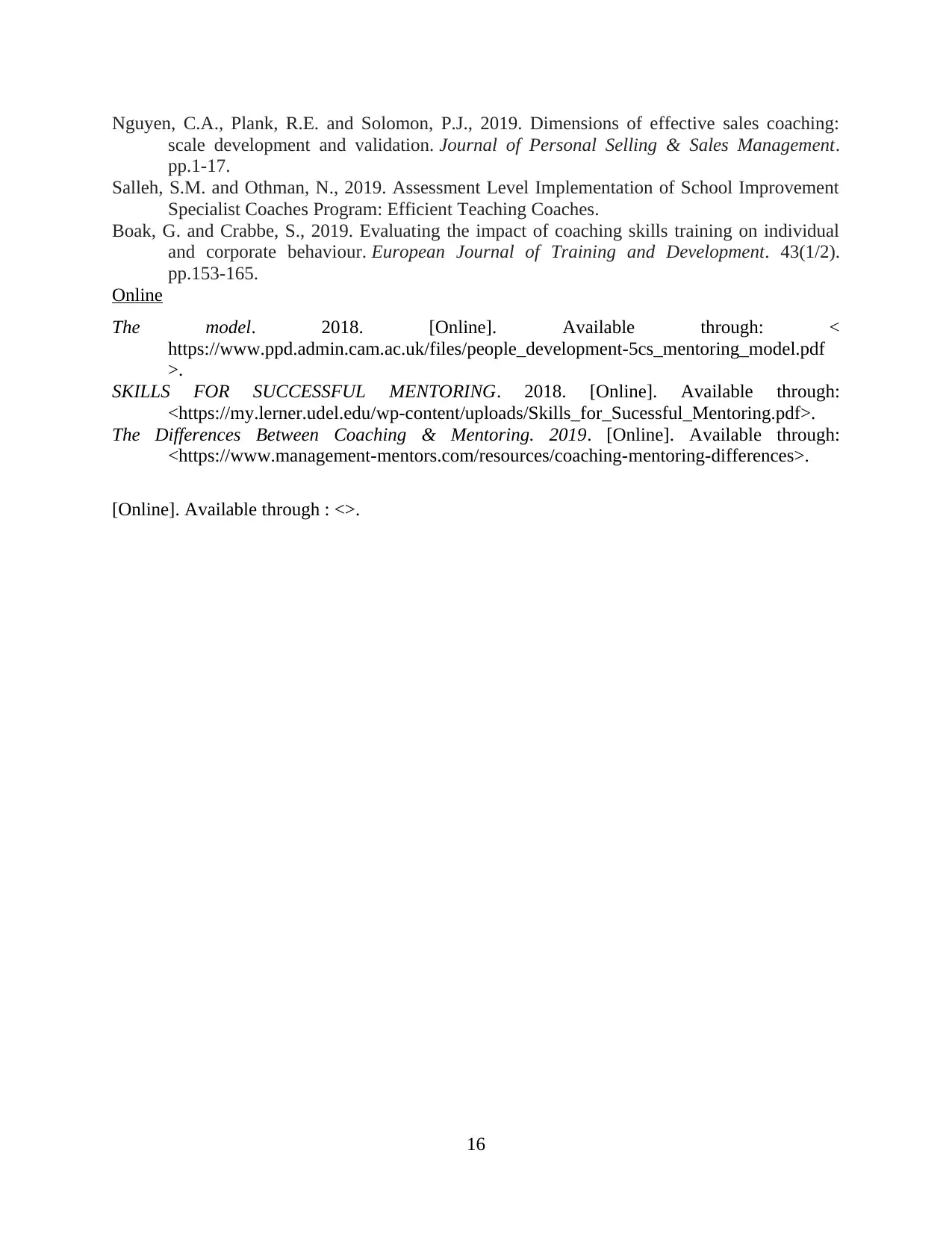
Nguyen, C.A., Plank, R.E. and Solomon, P.J., 2019. Dimensions of effective sales coaching:
scale development and validation. Journal of Personal Selling & Sales Management.
pp.1-17.
Salleh, S.M. and Othman, N., 2019. Assessment Level Implementation of School Improvement
Specialist Coaches Program: Efficient Teaching Coaches.
Boak, G. and Crabbe, S., 2019. Evaluating the impact of coaching skills training on individual
and corporate behaviour. European Journal of Training and Development. 43(1/2).
pp.153-165.
Online
The model. 2018. [Online]. Available through: <
https://www.ppd.admin.cam.ac.uk/files/people_development-5cs_mentoring_model.pdf
>.
SKILLS FOR SUCCESSFUL MENTORING. 2018. [Online]. Available through:
<https://my.lerner.udel.edu/wp-content/uploads/Skills_for_Sucessful_Mentoring.pdf>.
The Differences Between Coaching & Mentoring. 2019. [Online]. Available through:
<https://www.management-mentors.com/resources/coaching-mentoring-differences>.
[Online]. Available through : <>.
16
scale development and validation. Journal of Personal Selling & Sales Management.
pp.1-17.
Salleh, S.M. and Othman, N., 2019. Assessment Level Implementation of School Improvement
Specialist Coaches Program: Efficient Teaching Coaches.
Boak, G. and Crabbe, S., 2019. Evaluating the impact of coaching skills training on individual
and corporate behaviour. European Journal of Training and Development. 43(1/2).
pp.153-165.
Online
The model. 2018. [Online]. Available through: <
https://www.ppd.admin.cam.ac.uk/files/people_development-5cs_mentoring_model.pdf
>.
SKILLS FOR SUCCESSFUL MENTORING. 2018. [Online]. Available through:
<https://my.lerner.udel.edu/wp-content/uploads/Skills_for_Sucessful_Mentoring.pdf>.
The Differences Between Coaching & Mentoring. 2019. [Online]. Available through:
<https://www.management-mentors.com/resources/coaching-mentoring-differences>.
[Online]. Available through : <>.
16
1 out of 18
Related Documents
Your All-in-One AI-Powered Toolkit for Academic Success.
+13062052269
info@desklib.com
Available 24*7 on WhatsApp / Email
![[object Object]](/_next/static/media/star-bottom.7253800d.svg)
Unlock your academic potential
© 2024 | Zucol Services PVT LTD | All rights reserved.





